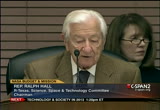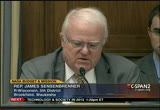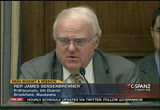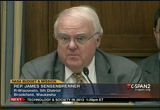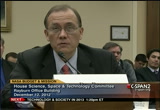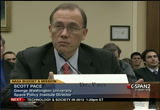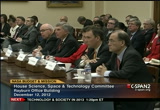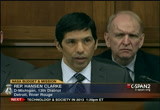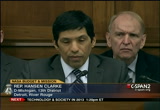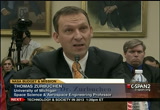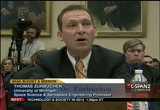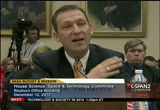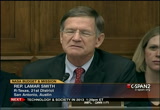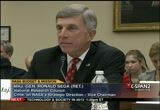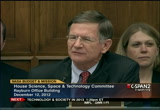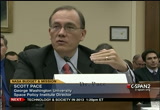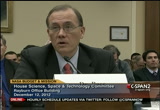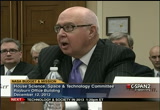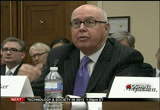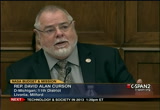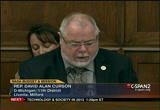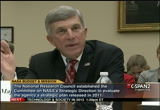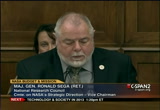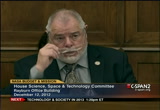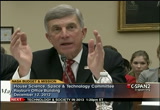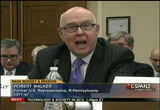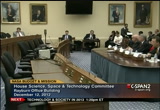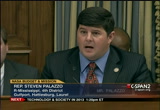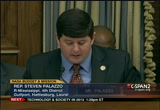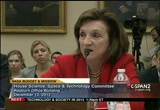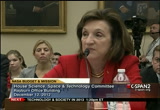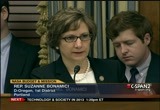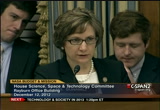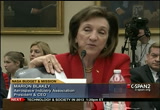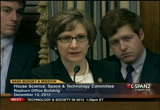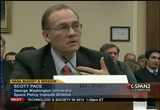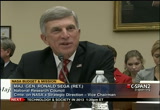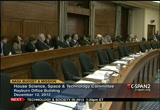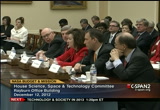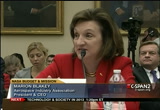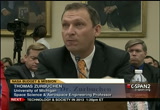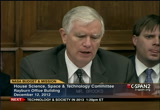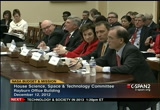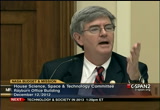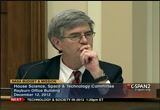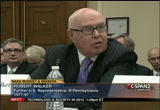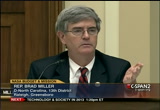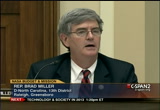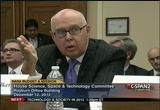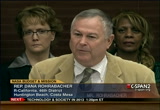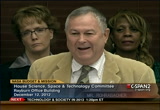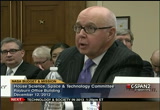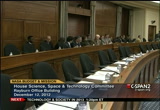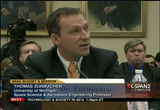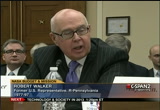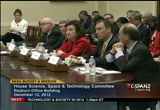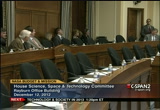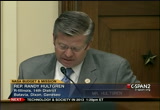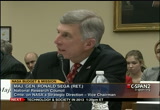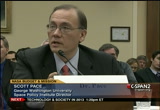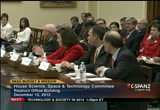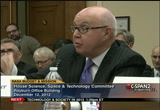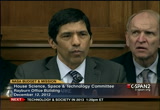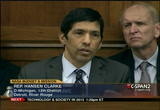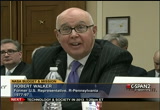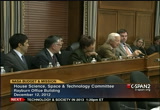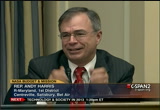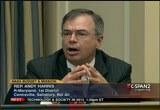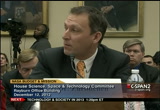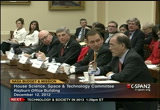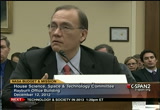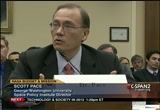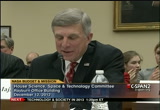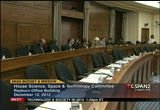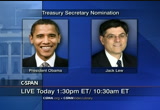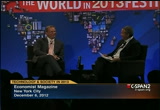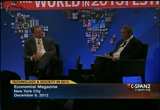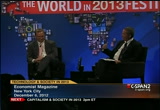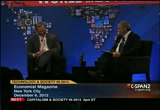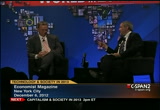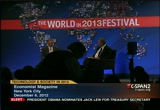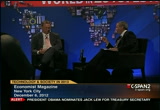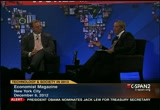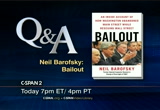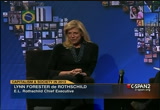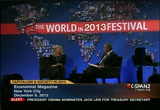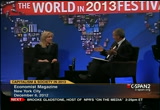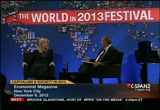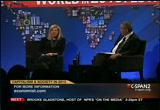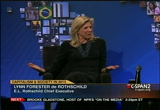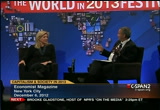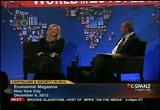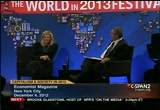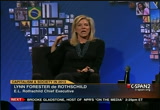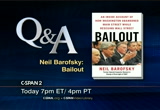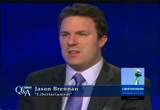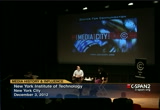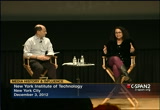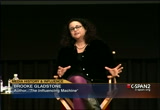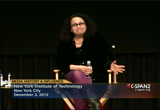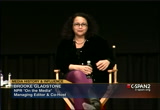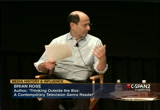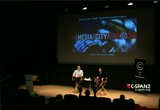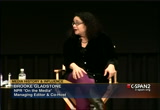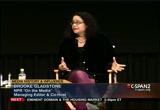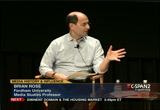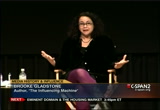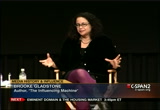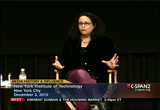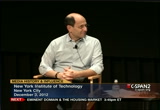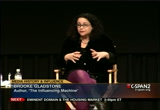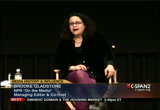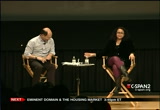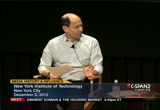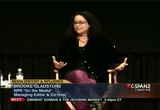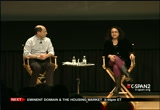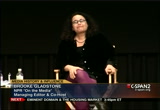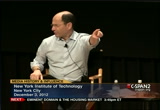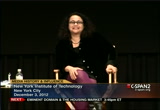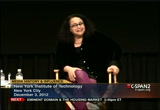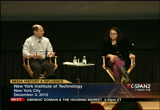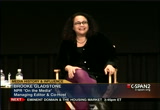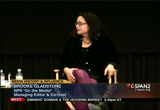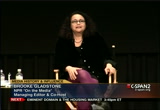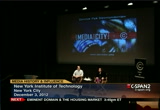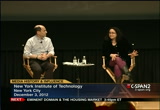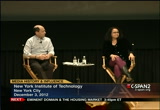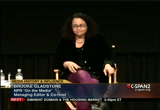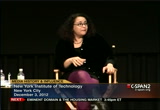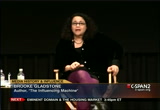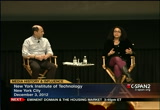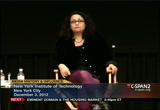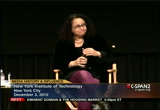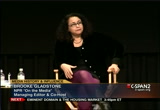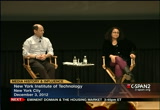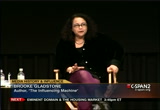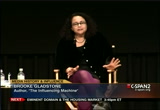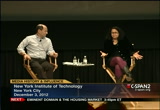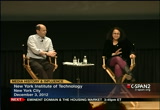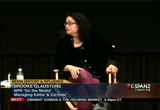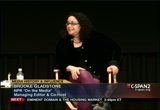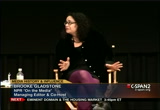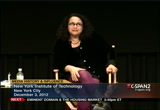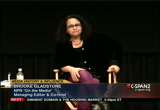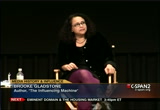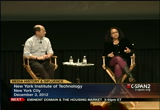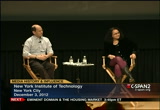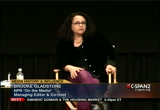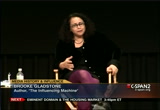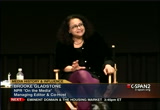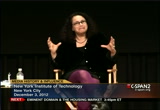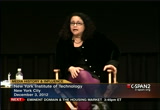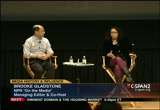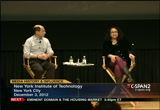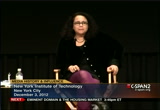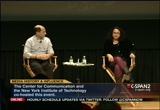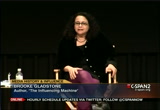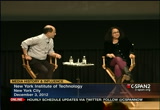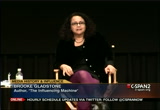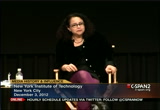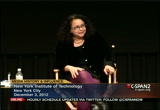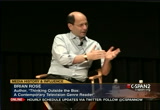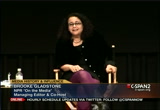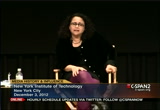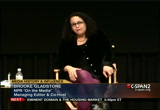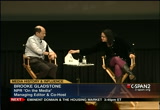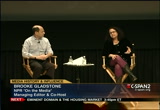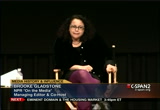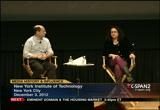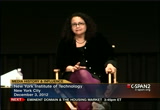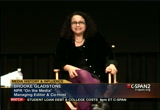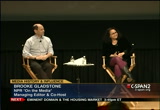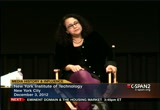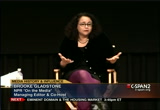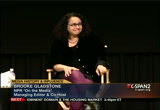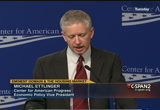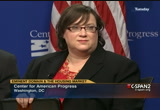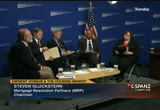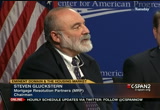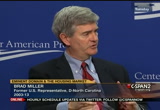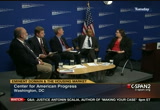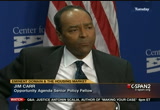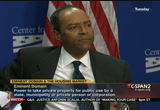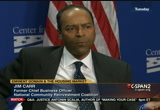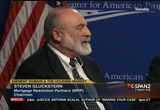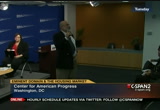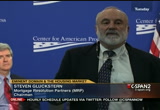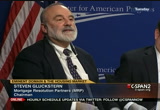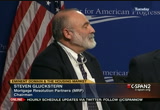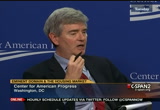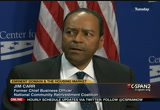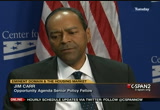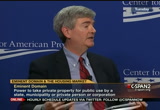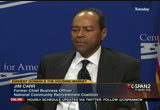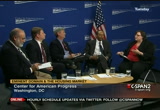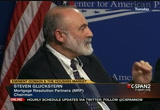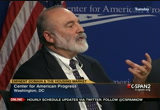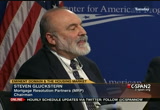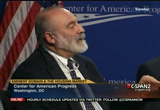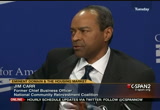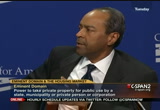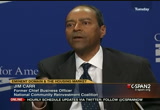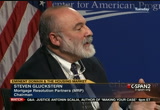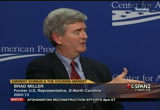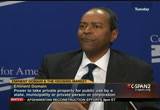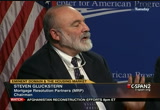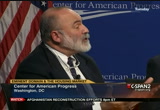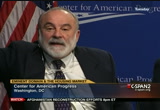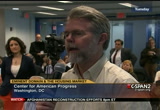tv U.S. Senate CSPAN January 10, 2013 12:00pm-5:00pm EST
12:00 pm
so we go from that. at this time a recognize mr. sensenbrenner for five minutes. >> thank you, mr. chairman. nasa was created in the '50s in reaction to the soviet union launching sputnik one, which ignited a space race beginning with a directory program. nasa's focus on putting cubans into space serve as its most high profile and arguably the most exciting facet of the agency. ..
12:01 pm
i appreciate your comment on the stimulus act appropriated more funds in one act the in this country has spent on nasa since its creation in 1958 and the budgets of spending more and a sample of priorities. and in terms of having this see is the continued united states pre-eminence, not just in demand space programs but in terms of science and inventions and everything else that goes along with it, and it ended up being
12:02 pm
washed away in the flood of stimulus france. as this hearing has highlighted already, the president's approach to human spaceflight lacks a clear mission and he is relying on the success of commercial space, which i agreed is vital that has dragged its feet and pushed its flight at nasa. i strongly support a public-private partnership for the country's space policy. however, it is up to nasa to develop the heavy lift rocket because the private sector doesn't have enough funds to do it by itself, and that heavy lift rocket needs enough thrust to overcome the administration shortsightedness. now why cancel inhofe, the international partners who supported the mission, president obama has taken a been there and done that approach but we haven't been there for 40 years and the international partners who would have helped us have never been there.
12:03 pm
if we cannot lead the world with space, china and russia will inevitably feel the way that we left behind, and that will have a trickle-down effect. the number of people at the train as scientists and engineers to keep america's pre-eminence not in space but practically everything else. so, dr. pace, will you describe the problems caused by the cancellation of the consolation program and what is needed from congress in this current fiscal environment to ensure the success of the space launch? >> thank you, sir. that is a tall order. i think one of the crucial things the consolation program was supposed to do is to provide a smooth transition for the work force and for the capability the nation has off of the shuttle program to what ever came next. and we've lost that now.
12:04 pm
the deep integration between the low earth orbit and the destinations that was hoped for i think is also gone. i would first say 2012 is not 2008. we are in a different and new situation today and we have to look at going forward. the primary, one of the primary problems with the end of the constellation was again cutting ourselves off from our international partners who didn't see how they were going to participate increasing risks to the international space station because while we certainly hope for and encourage and want to see the private sector to go for that work if there are delays, if there are problems, we don't really have a fallback option so we are down to a few critical paths for supporting the station, and so, the complementary nature between the commercial programs and the conservation program i felt was one of its strengths. the lack of a clear rationale for human exploration beyond the
12:05 pm
international space station is another serious problem. the administration's approach of being capability driven while it has a certain logic to it also has a lot of vulnerability. and historically i think a more strictly geopolitical approach such as i've talked about the close cold war approach for leading the international cooperation what in fact be a better approach for the united states. there are others that one could take that simply talking about the capabilities absent a strategic rationale that's integrated with other international u.s. interests i think is a very flout path as we are seeing today. >> thank you my time is expired. >> the gentleman from minnesota michigan, mr. clark. >> thank you mr. chair to get funding for nasa is important but especially investment in nasa creates jobs.
12:06 pm
if we want to increase funding nasa, we have to speed up the nation's economic recovery and i have a couple bills that i believe provide a very cost-effective way to strengthen our economic competitiveness and that would be to invest in the city that symbolizes both u.s. manufacturing and has the assets to help make the country's economic capabilities stronger and that is the city of detroit. the city of detroit is currently in fiscal constraints facing its own fiscal cliff. i will be soon introducing a bill that will allow the city to refinance its considerable debt at a low interest-rate saving money and likely stabilizing the city's financial situation. furthermore, i am proposing to eliminate capital gains tax and
12:07 pm
investment made in that city as a way to spur investment. in the city of detroit we have an extraordinary high number of people who've lost hope because they are not working. yet throughout the metropolitan detroit region, we have many employers who have thousands of jobs that are going unfilled because they can't find people skilled and qualified to be hired into those jobs. we have a skill gap in metropolitan detroit as well as in this country. dr. zurbuchen from the university of michigan, i know that you understand these economic challenges that we are facing in southeastern michigan. how do you believe that investing in nasa innovation could help us close that gap?
12:08 pm
>> thanks so much for the question, congressman. the first university graduate in my family, the only reason i studied science coming and the only reason i can to this country is because of the investment this committee or the committee's ahead of it have made, decades ago and because of the ins parisian that came from the space program i believe that power of inspiration and investments that come from this has a tremendous effect on the use on the young high school student that is making decisions for her career and the future that she has in front of her seeing that it is possible to make these dreams a reality so i do believe the inspiration aspect is a really important part and remains a very powerful force that this committee should consider. once we get them through the
12:09 pm
high schools and into our universities i believe the kind of diverse portfolio that i mentioned, the hands on experience explains to our students that technology and progress is not so much just about talking about ideas, it's about making these ideas have been. and i said be interested in knowing that at the university of michigan this last year was something like 5,000 students in the activities. aerospace is the third most represented falling on me by medical and computer science. aero space is usually represented because of the region's the congressman have mentioned the tremendous power of the ability of actually putting these companies out trying to have new approaches. some of my students were engaged
12:10 pm
in that so i believe the hands on experience that comes from nasa and the second aspect and very important solution that you are mentioning. the jobs are coming. we have startups and some of these really surprising kind of changes from technology that will develop under nasa offices ferc symbol technology there now, investigating under the city's sewer systems using robotics technology that general motors, a company that you are very much aware of has tremendous autonomy lessons learned in collaboration through these public-private partnerships that elected the space station so there is all multipronged aspect that lead your plea to the bottom, not just the bottom line but the top line to what our economy does and what the jobs are being created both in michigan and all over the country.
12:11 pm
>> we have time for another question. >> i yield back my time. >> the chair now recognizes chairman smith for five minutes. >> thank you mr. chairman. let me address my first question to you. you report that there is not much support in the scientific and space community for a mission to a near earth asteroid in 2025. is such a mission absolutely necessary to help us get to mars or are there alternatives and are there alternative missions as well that can replace that mission to the asteroid? >> as we looked at the mengin to
12:12 pm
an asteroid that is in 2010 national space policy of the u.s., in addition to being widely accepted there were some shortcomings noted by some of the people that appeared before the committee. i know to -- i note as we look back over time there's been several presidents that have talked about mars. it was noted by the committee. they also recognize that there are different paths that one could go if that was in fact the chosen destination in derwood may be looking at integrating some of the other aspects of
12:13 pm
nasa's work. for example, if that was the strategic goal, then you would look at the robotic missions that would support going there. >> do you think we should reconsider that to the near earth asteroid? >> the committee didn't address that directly but there were many questions that concern that has the past forward. other work in terms of technology aeronautics getting through the atmosphere of mars and science could be focused on the strategical one objectives. >> dr. pace, what do you think the american people would like for us to do in space? obviously hubbell is a popular curiosity with a great amount of interest. more specifically, how do you determine that coincidence
12:14 pm
between popular support and missions that are scientifically justified and missions that can be adjusted by budget constraints as well? >> sure. one of the patterns you see in public opinion, u.s. public opinion has been remarkably stable for space activity. it was never as large as people thought it was during apollo and it's never been low as people fought about after so the american public had a sense that we are exploring nation and a pioneering nation and we expect or assume that our leadership is in fact doing that and work on that and we trust that that is happening. when things like the program and without really clear path after that there was a sense of shock or concern. we agree one path or another but because they sense what if someone is working on this isn't
12:15 pm
there a path forward. getting to the specific missions i think what you see over and over again as people have an interest in life, they have an interesting people, the sense of direct so when there is a possibility of organic life on mars, you see lots of interest. much to the disciplined and of the geologists that think they are doing important work, too but life science and that sense of personal connection, space tourism that is talked about in that sense of personal participation in connection. >> would you put in that category earth like planets? >> absolutely to read the growth of a number of planets has been very exciting. i think that the telescope to see deeper into the gallery and things we've never seen before all inspire that sense of wonder that the american people assume their country is going to be a leader in doing.
12:16 pm
>> congressman walker, how we determine the balance between robotic and human missions? there are advantages and disadvantages to try to achieve a balance. >> clearly there needs to be an understanding of what humans can do best and would like to do best. the robots give us tremendous amounts of information but in general, the find the symptom there to find. it's based upon our belief of what might be capable of finding humans have the advantage of going and finding things that we never expected to find. they never expected to see. someone said the other day that the two rovers were on mars for many months did in the whole
12:17 pm
time that they were there for the whole time that they had been there about the work of a human could do in a day and a half. it's the ability to process information and get remarkable waste that is needed and so i think you do strike a balance. the precursor missions are always going to be robotic probably. in the end, you want to put humans into a place humans can find only those things they are difficult finding. >> thank you mr. chairman. >> i'm aware mr. walker's problem with space and time we excuse you at this time estimate i am fine, mr. chair. i had my office telling appointment that i will reschedule and so on. some of the chair recognizes the gentleman from michigan.
12:18 pm
>> thank you mr. chairman. and thanks to all of you that testified with this excellent testimony. i'm from an industry that is benefited much from nasa and the technology and everything they have spawned from the research, the brilliance that's come out of that comes from the although investor and everything from metals to paint to wait and i truly hope that nasa gets a long-term presence that they are looking for. it benefits this entire country but also the stimulus that we have been talked about that's been kicked around i would say that same industry that came out ahead of nasa for the stimulus we might have been in the depression and not been able to talk about any funding. so, with that, i would like to
12:19 pm
direct your question to general sega. you testified that nasa needs personal flexibility including the ability to conduct reductions and force and hire contractors rather than civil servants and socked instances i'd like to know if this is because there isn't a long-term commitment to the program or do you believe if there is a long-term commitment if there would be your strategy in personal and what provisions can nasa meek for the retraining of those highly educated nasa scientists and technicians if you end up with those people dhaka they are going to be right now from what i & understand. and two of sort these scientists and highly skilled people that were trained with tax dollars they are going to carry knowledge that no one else
12:20 pm
possesses that could be valuable to the country can the market absorb those? >> congressman, as we look at one of our tasks was to examine the organizational structure and then by changes to improve the effectiveness of the mission activity. so that is how we address that. as you arrive at new strategic objectives and goals and then nasa creates a strategic plan to accomplish those, we recommend flexibility, not necessarily how it would turn out in terms of the ability to look at personnel and infrastructure aligned with fees' strategic goals and objectives and implementation plans. so, we did note that the jet propulsion lab is a structure
12:21 pm
and contract folks that are engaged in many aspects of research development and operations for their satellites. different centers have a different mix in terms of contractors and civil servants. there were about four of them, 50/50. there were about three of them that were quite high in terms of contractors to nasa civil servants, one that was higher in terms of civil servants than contractors and there is more of that flexibility of doing what that center would be expected to accomplish any more integrated way. and so it was the flexibility better than a specific solution that we were recommending.
12:22 pm
>> they were seeking to acquire the american energy companies. how do we ensure that nasa's research talent pool and facilities are not required by the foreign interests that may be harmful to our national interests? i guess they would direct that. >> that wasn't addressed in our study in terms of the foreign ownership of the company's credit spigot you've written that the infrastructure capability no longer needs would this be included and what can be purchased by the foreign countries? >> i don't recall that we specified or considered in the
12:23 pm
deliberations the number the would be a potential buyer. i do want to give you an example of the visit that i made in ohio where the have a large chamber of separations and a great facility. some of the missions needed that, but it is a facility that also has the capacity for other work and so, they had looked at doing some of the work in that facility and they were also discussing to do work in that facility so it would be some aspects may be appropriate for a sale but others may be greater utilization of the facility in more creative ways.
12:24 pm
>> one question to congressman walker, you talked about the possibility of for-profit companies joining in and particularly research we all know there are great minds out there right now thinking about forming and space and mining and space which would be great projects to work together to regard their companies out there that could afford the funding to do the research and joined to help nasa become a viable program for the long term? >> absolutely. you have the company's right now that are creating a space craft and you have working relationships but would love to have close relationships to look towards the future. we announced the company just last week that is looking to go to the moon. certainly the expertise in that area would be invaluable and these are companies that are perfectly prepared to pay for the utilization of the sotheby's
12:25 pm
and the utilization of their talent and so there are lots of opportunities out there that could be expanded even more into the future. you mentioned the automobile industry. it's in the process of developing autonomous vehicles. nobody has done more a laboratory on the autonomous vehicles than nasa. my guess is that there have been some partnerships and that because our party can be expanded. >> thank you. >> the gentleman from mississippi, five minutes. >> thank you, chairman. in the upcoming nasa reauthorization, some of the recent bills we passed in putting the indemnification bill as it has already been expressed by other members and the witnesses i'm concerned with the vision and the addition to become budget issues causing
12:26 pm
grief in the long and short-term programs and commissions what are the long-term goals to take into account all of the initiatives from space exploration. the report attempted to answer these questions and discuss some of them they could take the job will become more difficult as the budgets shrink. the administration and congress must do a better job of informing the american people about the important work nasa does and the overwhelming benefits to society reaches as a result. maintaining the leadership in the world is extremely important and is worth investing in. but we must not forget that an investment is also an investment in research to the demint for future technologies. nasa has a proven record and thousands of examples from the technologies that we simply cannot live without in 2012.
12:27 pm
i would like to remind everyone the speech that was given that right university in 1962. he addressed the effort to put a man on the moon and use that famous line and i am paraphrasing kennedy said we did these things not because they're easy but because they are hard. the questions we must answer and the choices that must be made are anything but easy. but like kennedy we shouldn't shrink back simply because they are hard. nasa must step up to the challenge or risk its legacy of success and leadership. that's not an outcome anyone in this room wants to see happen. so why thank you all for sharing your comments with us today and i believe i have time for one question. given the end of the shuttle program and a lack of the strategic direction, how does the uncertainty threaten the base and can you characterize the capabilities that are at risk and perhaps even give us some examples?
12:28 pm
>> certainly the constellation was extremely disruptive from the industrial base we had more than 12,000 contractors working at this point. it is a thousand and a diminishing. all of those people and their skilled expertise go elsewhere and frankly they may very well the and to other industries. so, we are extremely concerned that there would be the kind of stability. >> this is what is at stake behind the many companies and universities etc with the space program. >> how do you replace the lost
12:29 pm
tau that? is there a financial cost and is there a cost in town as well? will there not be a gap before we can possibly replace that talent? >> there could very well be and we are worried about that because as much as we support the programs tall levels of education, you still have to have the opportunities for the young people to see in front of them that appear to be important and exciting and if those opportunities are not clear when they are making choices with high school graduate school etc., they will definitely go elsewhere and we do not see that kind of surge that we should be seeking an engineering and other kind of challenge right now. we have a huge amount of retirees in the industry. we have an aging population so we are going to see. we don't have the kind of people that we need especially as we have to step up to read
12:30 pm
12:31 pm
space programs have improved our lives from vaccination research to guiding first-responders to weather satellites and missile detection satellites. and then dr. zurbuchen, i hope i got your name right, you talk about the meaning and purpose of exploration in space with a society that doesn't always see a tangible benefit. dr. pace, you say in today's environment with massive debt and economic recovery sustaining discretionary expenditures for space exploration will be especially challenging unless there is a clear rationale linking such efforts to broader national interest the that can be supported in a bipartisan manner over many years. i know there has been some discussion already about the skills gap and stem education. i want to point out the role of nasa is promoting stem education should be more clearly articulated and
12:32 pm
nasa's strategic plan but what i would like you to talk about is, what if anything is the industry doing to convey to the public the benefits of space exploration? in other words, how can the contributions of our space program to national interests be communicated not just to stakeholders but also to the public at large? and miss make can i, if you -- blakey would you like to start? >> i thank you very much for the opportunity to expand on that a bit because because we did put a great deal of effort into this brand new report called, space in our world, which belief me we'll make certain every member of this congress and the new congress has a copy because you're all ambassadors on this front but we also looked at the fact through social media this could be accessible to every american. we've been tweeting it. we've been putting out specific nuggets, if you will, of examples. we're looking to excite
12:33 pm
young people at the universities because there are examples in here of where we're working in a variety of universities in the private sector have kicked off enormous benefits for our society. so i simply would say that it is something that i think we need to do a better job on because i do not believe the public has any idea how in their daily life, everyday life, they are over and over again using the work that comes out of our nasa programs and our space programs broadly, including nro and some of our classified programs. it all moves out eventually into the economy and it's been a huge spur for the economy. >> i look forward to seeing the report. anyone else care to add to that? dr. pace? >> i would say aside from experience being at the university and i teach both graduate and undergraduate students and many of them come and take courses in space and space policy who are not space enthusiasts.
12:34 pm
they're international affairs students, political science majors and economics people. to me it is always very gratifying as they hear about the relationship of space to the economy and relationship to our international relations just how critical they realize this subject is. many will come and say, after going you there the course they walk outside and they have a new perspective on the sky above them. they had no idea that all these things were going on overhead. remote sensing, gps systems, communication satellites, how deeply embedded space is to the entire critical infrastructure to the planet. it is almost invisible. once they realize it's there they take on a new appreciation for it. they take on a appreciation for the immense symbolism space has and how it represents our strategic relationships with our allies, japan and europe. how the clinton administration used bringing the russians into the space station program, very controversial.
12:35 pm
but as a way of symbolizing a post-soviet relationship with them. so really macro sweep of international affairs, the centrality to the economy is something that students then come to know and appreciate. i don't know how to do that for the public as a whole but i know we can certainly do it for students and it happens over and over and over again as soon as they see that, as soon as it is laid out for them. >> well, thank you. and, major general, go ahead. i have a few seconds left. >> okay. i just wanted to note that our committee did look at that as well and nasa, in our view, is making some very positive steps in the communication with regard to social media for example and their stem programs. i personally one of those that were inspired as a young boy living in northeastern ohio during the mercury, gemini and apollo programs studying math and science and taking my first airplane in my live from
12:36 pm
chief and, ohio to the air force academy in denver, colorado. in our study we also looked at events that are clear and compelling such as curiosity that the communications to the public was outstanding. and so in route to identifying clear strategic objectives and goals and then developing a strategic plan for nasa some of that story becomes clearer and easier to tell. >> thank you. thank you. out of time. thank you, mr. chair. >> gentlelady yields back her time. congressman brooks, alabama. five minutes. >> thank you, mr. chairman. dr. zurbuchen and also miss blakey, your testimony, in particular dr. zurbuchen highlights the importance of maintaining pipeline ever engineers and scientists to insure we continue to innovate in the future with
12:37 pm
respect to both of you. what are your recommendations for a program that provides opportunities to our graduate and post-doctoral students to the benefit of future leadership in space? >> thanks so much, congressman. my personal feeling such a program will be hugely advantageous for this nation and could in many ways in fact enable ideas that were talked about on this panel. i think in general we have tremendous interests in our talent, some of our talent to really engage in this. and such a program that you mentioned i think will be very postively reacted upon. >> i must also tell you because i've had the opportunity to go to almost all of nasa's centers around the country as a member of the nasa advisory council, i have been very, very impressed to the degree which local university talent is integrated to many of the national programs. jpl, there is practically no
12:38 pm
one under 30 it appears as you go around the entire facility. there is a big emphasis on trying to pull in young people both at the undergraduate and graduate level. i will also recommend this. if you all haven't seen two videos that are out there, both stemming from the curiosity rovers, i would recommend them. one is seven minutes of terror but it has relatively young engineers talking about that seven minutes when they did not know whether in fact the curiosity rover was on mars and the other one is a very funny rap video, again, done by young people it in the nasa framework, all about how exciting it is to work at nasa and how exciting it is to be involved in the space program. those things are getting millions of hits on rue tube. so -- youtube. there is a lot going on some of us. don't often see. >> do you have any specific suggestions what the federal government should be doing to encourage stem education
12:39 pm
at the collegiate level or postgraduate level? >> my personal recommendation would be to focus on these modest and small-scale programs with tremendous emphasis and really make sure that, for example, suborbit tall programs and programs that support small scale missions as well as explorer programs are funded at the level that, that really makes this substantial impact that we have, that it can have towards talent development n my opinion there is no other investment at the coliege -- collegiate level that will have than hands-on experience for development of talent for industry and nasa than investments like that. >> i would also say that you see a great deal of emphasis now in industry on pairing with universities on specifically focused
12:40 pm
programs that often involve research for undergraduates. i can take them all the way into the graduate level with internships in the summertime in those companies and going back into the university where the curriculum is also tailored to becoming professional with a high degree of expertise in one or another of these subspecialties. there is lot more than no longer is generalized but is really going into the engineering schools and saying, let us help you teach so that people come out with very concrete interests and ambitions at the end that are highly marketable. >> all right. congressman walker, general sega and dr. pace, briefly, legislation has been introduced calling for lengthening the term of the nasa administrator as a way to help stablize nasa's strategic direction. testimony that we've heard makes it clear that the largest problem is not at the nasa level, it's a problem of national leadership and coming to a consensus between the
12:41 pm
white house and the congress. in your judgement would a longer term for the nasa administrator have a positive effect on nasa? >> i think separating the nasa administrator from the political structure of the country would be a mistake. i think that the, that that kind of a situation would keep nasa, you know, out of the mainstream of where political thought is going and i don't think that that would be the wise course for the nation to take. >> thank you. general sega? >> sir, our community did not address the term of the nasa administrator. >> do you have a judgment, an opinion? >> i don't. i haven't thought through it. >> that's fine. thank you. dr. pace? >> as an academic i would answer it depends. i would say that, i think a slightly longer term or a set term could be useful but i share congressman walker's concern about making sure that there's acceptance of
12:42 pm
that on the part of both the house and the senate. that that was, if that was the judgement of both house and senate, that a longer term would be part of that stable approach, then i think yes. if there wasn't such agreement then i don't think it would be terribly useful for the reasons he described. >> thank you, mr. chairman, for the time allotted. also thank you for the opportunity to serve under your leadership over the past two years as chairman of this committee. it's been a real pleasure. >> thank you. it might be one thing the house and senate could agree on, both would be against it i think. [laughter] recognize mr. miller, jent nan from north carolina. >> thank you, mr. chairman. dr. pace, the answer, it depends would also qualify you to be a lawyer. congressman walker, i was interested in your idea of corporate sponsorships. i'm kind of old-fashioned, i liked it when taxpayer-built stadiums were named after
12:43 pm
our honored war dead instead of selling naming rights. and i just can't quite imagine that picture of neil armstrong and buzz you aldrin on the moon or ed white walking in space, in space suits that made them look like nascar drivers. so, part of me rebels at it in the first place but second, i worry about the stability of the funding. we heard a lot today about the need for stable funding and stable leadership at nasa. sponsorships, naming rights, tends not to be a particularly stable source of funding because corporations merge, they get acquired, they run into trouble, they have to scale back. will that be a stable source of funding? >> well, certainly there is instability in that but the look, the appropriations process has been a very instable or unstable source of funding for nasa as well, and so, you know, this is
12:44 pm
one way of reaching out to bring additional resource into nasa. it goes further than that. these are industries then that take, take a huge interest in nasa's activities. people who provide sponsorships then, buildout, we've been talking here at this table, about the need for nasa to be recognized broadly in the community. this is the way of assuring that. you mentioned nascar. the companies that provide those sponsorships take a huge interest in what happens in nascar and particularly with the teams that they sponsor and they are a part of expanding the acceptance of the nascar racing well beyond the, the day's activities on a sunday at the racetrack. and so this is an opportunity for us to have an outreach that goes to people who actually then have some skin in the game. and i think it could be an
12:45 pm
extremely important way of bringing resources into an agency that is badly in need of significant resources for the future. >> i want to make it clear, i wasn't picking a fight with nascar. i'm from north carolina. >> i didn't think you would. >> i didn't run for re-election but i want to be able to go out in public. there's been a lot of discussion of, public/private partnerships. obviously we do need to think about commercial applications of our space technology and our capabilities. but i worry. we have had probofls, discussions in this committee, privatizing the national weather service, which is entirely built with taxpayer-funded research. it is a capability that has been entirely provided as a public service, built by taxpayer funding, and the
12:46 pm
proposals seem to becoming from a company that wanted to buy the national weather service, have monopoly power and sell the data for a profit. since there's not an active market in national weather services, pricing it seemed to be kind of hard and the public, the problem of having that information provided for a profit would, by somebody with a monopoly power worried me. it struck me as what happened with the sale of state-owned enterprises in companies, industries in, as a soviet union dissolved to oligarchs. i want to make sure we're not taken. how do we make sure we are not taken in these public/private partnerships and that aren't giving them monopoly power perhaps for something that should be provide as a government service? >> i would remind you one of the problems we have with the weather service right now the fact that they haven't been able to fly
12:47 pm
their new modern satellites and so on and we risk a gap in a lot of valuable information going forward because the government hasn't been capable of moving forward. and so, you know, there are, there are problems on both sides. i would say to you that that is where the whole issue of oversight of all this activities, where this committee would play an extremely important role in assuring that the kinds of private public partnerships that were entered into would in fact be in the public interest and there are a number of ways you can write bills to insure that kind of activity. as i mentioned before you can do it through an ffrdc kind of mechanism where the federal government remains actively involved in what those companies doing it, how those companies are doing their job and in fact provides an annual stream of funding so that there are ways of structuring this that would assure that the public interest is still
12:48 pm
maintained. >> mr. chairman, my time has expired. >> i thank the gentleman. the chair recognizes the gentleman from california, mr. rohrabacher. >> thank you very much, mr. chairman. let me also echo the gratitude that i have for having served with you and you provided excellent leadership to this committee and over the years it has been an honor working with you and those who will be leaving us as well. from our last question, let's just note we have a trillion dollars that we're spending more than we're taking in. one-third of the federal budget now is, is debt. we're increasing in debt. thus if we're going to do things in the future and if nasa or any of the things that we're going to do in the future are to survive and or to actually play an important role in our country's future we've got to be creative. we've got to be creative.
12:49 pm
we've got to find new approaches, and, that i think is the number one commitment that we've got because otherwise it will just fall apart. and i will have to say that, when we were, have a trillion dollars more in debt you have to deal with, i don't believe the american people are growing to put nasa on the top of their priority list, which means we have to be even more creative for those of us who do believe the importance of space-related assets. let's just note for the hearing today we already talked about how this infrastructure, this invisible infrastructure, that we depend upon, i mean i remember when telephone calls costs so much money. it has been space-based assets that brought that down. gps, people have no idea, the potential, even future potential of gps. we're just now experiencing that and of course our national security, weather,
12:50 pm
all that has been talked about. these are all things that deal with space-based assets and i believe that nasa should be the one who actually is pushing the envelope on what space-based assets will benefit humankind in the future. i, let me just note that one thing that is sure, if you're to have space-based assets, we've got to have an environment in space that is capable to use, and today, that is under threat. and if there's anything that nasa, that i would see, that nasa can take responsibility for, alongwith a partnership, a global partnership, and lead the way, it is making sure that we cleared the debris from space so we can have space-based assets. if we don't clear the debris, the debris will clear us out of space eventually and we haven't really focused on
12:51 pm
that, that's something, maybe that is one of those challenges that young people and everybody else can understand. the other challenge perhaps, i don't know if anybody noticed, let me see if i have the actual number, yes, did anyone notice, 2012, x, e, 54? anybody notice that? that happened to have been an asteroid that was discovered sunday and yesterday, flu between the earth and the moon. that asteroid had the same destruct tiff power as the -- how do you pronounce it? what is it? tungusta asteroid that destroyed hundreds of miles of siberia about 100 years ago. yet we didn't discover it until sunday. now, those are huge challenges that we need to,
12:52 pm
we need to take up. we're not going to have space-based assets unless we clear the debris and we're not going to have a safe planet unless we can detect and deflect these type of challenges. i would hope that nasa, mr. chairman, if i have any vision for nasa,, nasa should be taking up that challenge so that we can use space for the betterment of mankind in the future. and you have got 45 seconds to comment on my pontiffcation. bob? >> certainly the issue of space debris is a crucial issue. the commercial industry is facing all kind of problems these days with monitoring that and, much of what we monitor is larger than some of the particles that could actually cause real damage in space and so that is a
12:53 pm
real problem that needs to be addressed, and there are actually some people out there in the private sector that have some interesting ideas how we can do that. >> as our committee looked at the issue of asteroids i commented on the human mission to them but also recognized the importance of increasing our understanding of the asteroids and currently there's a satellite that is in that area. >> okay. thank you very much. >> gentleman yields back. i don't, yeah, we have one more here. chair recognizes mrs. edwards from maryland. >> thank you, mr. chairman. and i just want to echo how delightful it has been to have you as our chairman for the past couple years. i really, both enjoyed your company and, your service on the committee and so i thank you for that.
12:54 pm
and for tolerating me, occasionally. i was just, i'm a twitter follower of nasa's and i noted that nasa has about 3.2 million followers, which is not insignificant. it is not as much as the president or oprah but it's more than the first lady and rg-3 and nascar. and so there are people out there who really have an interest in nasa and value nasa and how we capture that i think so it also translates into support on a fiscal central florida -- fiscal level, i think is the challenges of the range of activity we expect of the agency. just this, you know, over this last couple of hours or so as i'm following my twitter feeds then i noted that one, nasa assures us that the world will not end on december 21st in case
12:55 pm
anybody wondered, and that the hashtag, curiosity, was the fifth most followed or used hashtag over this last year, which says to me that especially the curiosity, it is striking some kind of a chord in the public and i think that is actually a good thing for us because i think it's important for the public to embrace nasa. when i was growing up our embrace of the agency was because of the apollo missions. it was sitting in, you know, kindergarten and first grade, whatever those other grades and watching the liftoff and that inspired a generation and inspired a nation and i think doctor, administrator blakey, you pointed out it requires that kind of public inspiration in order for us to generate the support for the other various work that the agency does. i wonder if, i want to think
12:56 pm
outside the box in a way about what it is that we can do to strengthen the fiscal house of the agency and one of the things i would like to look at especially where science is concerned is that the difficulty the agency has in doing science on a year by year basis. it really doesn't make any sense. it's not what you generally find in university and other kind of, kind of research where you know as an investigator where you're starting, what your resources are over a period of time. >> and then you can plan out the investigation and, some of what we saw for example, with the james webb space telescope, with all of these different, and there were a lot of problems but all of these different levels of funding from one year to the next year and not knowing and reprograming and things, that in fact you have instruments that sit around that aren't supposed to be sitting here because they're supposed to be up there. then you actually end up over the course of time
12:57 pm
spending a lot more money. and so i wonder if i could hear from any of but the idea, with respect to scientific funding, agency funding, that we went to, you know, to a two or multiyear funding stream just for these programs understanding that it's different than funding other kinds of things that the government does? and i just wonder if you have some comments about that? >> i have. currently eight ph.d students who are supported by funding streams that you're talking about. i know first-hand the difficulty of managing these young people's lives in an environment in which decisions could happen at, on a week to week basis. all of sudden the necessary funding stream disappears. once we lose a ph.d student, like this for example, we can not really get, we'll do whatever we can at the university to cover that ph.d student through but we have many cases, especially
12:58 pm
in areas where space interacts with biology in the past where we lost something like 30, just in our university alone, 30 ph.d students in a queue that never came back. so, at, tools that will create stability in that regard, would that be tremendously considered a potential fashion from people like me and others. >> congressman walker, i wonder if you could comment. you've been in this place, on an idea like that and where we might be able to take it? >> well i have long believed we do great damage to our science programs with annual appropriations process. the fact is, that, you do have to have to have a long-term out look whether you're doing space science or bench science. so we have a real problem in that, we have too often
12:59 pm
scrubbed the authorization process in favor of the appropriations process. i mean one of the great reforms around this place that would work would be to actually enforce the rules of the congress and say that you have to have an authorization in place before you can pass an appropriation because the fact is we need to have the stability of long-term set policy in order to do science well. and by abandoning authorization process too often, we have put the policy decisions in the hands of the appropriators and they have a one-year horizon, one year horizons do not work in science. >> thank you, mr. chairman. >> if i might i would mention one other because there is good precedent for this in terms of some defense programs. the industry would like to see more use of multiyear in terms of complex development programs. but when you look at those in the dod arena you do see it has been an excellent force for holding down costs and having the kind of
1:00 pm
1:01 pm
when it comes to nasa and science i think really puts us at a disadvantage to other nations who are thinking five, ten, 20 years in the future and we are lucky if we are talking one year. we are talking about 90 days or continuing resolution. we've got to change that and reach across the aisle to make sure that happens this is such an important discussion and something i'm passionate about a lot to ask a couple quick questions. first i wonder if i could address to you if your thoughts what the report have had the same tenor and conclusions of president obama hadn't canceled the program four years ago?
1:02 pm
>> the factors the brought us to the point of transition was also returning the shuttle program and something else follows it and the ability to have a consensus on strategic objectives and goals. this longer-term thinking is important, and to be able to have it for long-term clearly it costs us administrations and terms in congress, so the study was first prompted by the congressman to nasa, and then to the nrc that the issue of the longer term peace i think that would be enduring regardless of some of the events.
1:03 pm
>> i wonder if i could ask some of the other folks here starting with dr. pace if you wouldn't mind your thoughts of how you think these results and conclusions would be different if the consolation program hadn't been counseled -- cancelled. >> i think that there are two parts to the discussions. we would have maybe a slightly different tenor if the program hadn't been canceled. but the deeper problem really is policy. the national space policy in 2010i think is quite a good document. it's very thoughtful and balanced and a lot of good material. the part that sticks out for me is the asteroid and mars aspect which to my mind comes out a bit of left field. it didn't have international
1:04 pm
context, it wasn't mindful of the realities and so it's really distinct from the rest of the policy. i think if that mistake hadn't been made you could have a rational discussion about how to either moderate, change, term comer revamp the program in a way that would have been acceptable for the administration going forward. so in those things it is policy choices at the root of the issue. what is the strategy that you are falling and then the programmatic outcomes and the budgetary outcomes follow from that. so that is where i would point. >> i would ask the other members of you have any thoughts on that with about a minute left. >> certainly. the variables of the industrial base it's been very difficult. we feel very strongly to follow it that it is important to maintain both the end emphasis on the commercial crew and
1:05 pm
resupply. we have to keep that on track and at the same time have the ability to go to deep space. those are both very important. >> i think it has to be recognized that financially the program is one in an unsustainable cost profile, and it was about to eat the science programs and a mother to become number of things that the kind of cost it was accumulating. and so, you know, you have to look at it in terms of where would we be in terms of those costs under cutting the programs if it hadn't gotten the kind of money that the chairman referred to earlier. of course it could be done if you gave additional $3 billion. no one believes that they were going to get $3 billion at that point. >> thank you for being here. my hope is we can continue those
1:06 pm
and really have a great vision for nasa and from nasa. again, chairman, thank you for all you've done, appreciate your service so much and friendship working together for a long time to come. i yield back. >> let me pass on don't worry about it if you don't like flowers it will finally grow on you. [laughter] >> i appreciate the opportunity and i also want to ask everyone for their comment on how nasa's long-term strategically can work more effectively with the private industry to move on specific areas. what technology transfer and how
1:07 pm
the transfer of the research to private industry may be to other federal agencies could play a large role in our strategic vision. dr. sega, you can also address that if you wish. the other issue is how we can best restructure nasa in a way that would likely need congressional authorization. these were issues that were raised by the chairman walter in his illustration of the sponsorship of one of our missions although i prefer it would be more appropriate but in any event, congressional authorization needed to restructure to promote that could lead to more effective private partnerships and how we
1:08 pm
strengthen the role of technology transfer in the mission? >> quickly i will give you one and there are a number of ways you can do this. but the commission recommended that the center would be turned into the operation said they would have to be modified and not all the centers that do research and development. but if they would be structured in a way that would allow them to receive both public money and private money into their operations. i think something like that is certainly one of the places that has to look. one of the things they say is the alternative to that may be the closing of some of the center's, you know or the reduction of the size. this is a way that you can begin to keep the center's and place
1:09 pm
and how do you make them into the viable economic unit inside of the communities they have and for the nation and i think that this committee needs to look at how you might restructure them in a way that allows them to attract both private and public money. >> would the gentleman yield back. >> mr. chair i want to cranking member johnson for the leadership providing the great opportunity to participate you are a true gentleman in every respect and how you govern this committee in a fair and balanced way. it's an honor to serve with you, all of you in this country. thank you so much. >> thank you. ms. johnson, i agree. you are a gentleman. thank you. the chair recognizes dr. harris for five minutes.
1:10 pm
>> thank you mr. chairman i want to thank the panel for being here today to review what the strategy is going forward. i am going to ask first comments on a very particular aspect and leads off with the chairman had said that at some point there is an important input but to be honest the crippled critical things that we are doing really there is no mandan but necessary. i work in the operating room. the surge that we are giving you could do from around the world. you could have the surgeon sitting around the world from where that machine is actually in putting an intricate operation with feedback and i don't remember the fancy scientific name but you actually feel what they feel like and all of the inputs the chairman indicates it's now being gained
1:11 pm
and if you talk to the teenagers at home, robotics and clubs and high schools, this is to some extent the future. and given the expense of redundancy necessary in the program and our need to get the most training and research and engineering experience knowledge for the dollars that we spend, isn't it time to say that maybe the program should be rare and reserved for the occasions because they just don't deliver the bank for the dhaka, and talking about basic science knowledge. your testimony is excellent. we need to know these things and there are other societal benefits. but to the doctors on the panel, isn't that really the way we ought to be thinking is our basic expansion of knowledge
1:12 pm
through a government funded entity like nasa and all the other things that we do, is that the way that we should go? >> my personal feeling is that there is a tremendous value over time that has come both from demand. i do believe that robotics will have for the next 20 years or so as we make predictions which as you know is always hard as we make predictions we will have more economic impact on how we are going to drive the cars and fly airplanes and how are we -- all surgeries are being performed and, you know, human space missions. it's my belief though if we go through a time scale of 30 or more years that prediction is going to be tougher to make. i believe that in many ways when we put a human in the low and especially if you go to places you do not know where you are
1:13 pm
going and the true exploration that things happen on the innovation front that help us uncover aspects of our experience and also of technology that will have tremendous impact in long-term certainly the same thing happen on the apollo side. it is in the case that even though the examples you are mentioning are truly compelling, there are many aspects to our lives but they come from the human side of nasa has also basically if you ask the question as clearly as you did, should we just forget all about it, i certainly wouldn't subscribe to that kind of recommendation. >> i want to emphasize not forget, but lower the emphasis a little bit. dr. pace? >> sure to be a first it has to make a distinction between science and exploration. nasa as more than just the science agency. it's an exploration agency and a
1:14 pm
tool of the u.s. foreign policy so it as a whole bunch of things other than just science. if we are looking at science in the survey that straightforward. robotics systems are what to do but the reason that you do humans in part is for exploring the unknown by literally putting people in an unusual or an alien situation you learn things you wouldn't learn if you stayed at home and there is a wonderful example of looking at salmonella and how they become in the space station and this means there is a gene sequencing issue and if we talk about salmonella that isn't something that emerged in the ground based laboratories. it emerges when we put life sciences people in a very different environment to go into the unknown. human space flight is probably the most interdisciplinary scientific and technical the activity this country can engage in much broader than biotech and
1:15 pm
any of the of their particular fields because all fields have to come together to pull off a successful mission. it's incredibly, incredibly hard. but that's where the benefit is from pushing into the unknown so i would say as a part of your portfolio of technologies that humans have to be part of because they do represent this really challenging the interdisciplinary problem that is unique and should be part of our national portfolio because there is nothing that replaces the symbolism, the motion, the connection it makes not only to the american people but also to our partners around the world. the international space station is not only in engineering the massive diplomatic triumph that this paid a great benefit for this country already in terms of building relationships around the world sequestered for nasa human space flight is what do you want it to become a what national interest do you want it to serve if it is only science as defined in the survey, then i
1:16 pm
think you can go down and robotic have the division for nasa is much bigger than just that. it is a science agency but it is also so much more. >> thank you so much for the opportunity to serve on the committee. >> general sega wants to add something. >> i just wanted to add the question itself poses one of the key points of the study that a national consensus determined the strategic goals and objectives are important and from that would flow the balance and integration perhaps of exploration science technology and aeronautics for nasa. one other point is as the congressman talked about in the report is one of the options was the restructuring program to reduce infrastructure and personnel costs and improve efficiency. we didn't go to any of the
1:17 pm
details that was an option that we would choose how to do at. thank you very much, sir. >> the gentleman has yielded that. i want to thank everyone think you for your time and preparation and travel and presentation. and all the staff here, i want to thank the wonderful staff that make this world go and i would like to ask unanimous consent that as we close today, we close in memory of the life of gabriel gifford and remember neil armstrong for a moment of silence. >> we are closed.
1:18 pm
>> the associated press reported today vice president joe biden plans to deliver recommendations to president obama on steps to curb violence by next tuesday. he says a consensus is emerging. a proposal such as tightening background checks and banning high capacity ammunition magazines. the vice president told a group of interested groups that he's never heard quite so much talk about high-capacity magazine as he has since the last defeat a mass shooting in newtown connecticut. he was set to meet with the national rifle this is the asian, the powerful pro-gun organization. >> president obama set to announce his nominee for treasury secretary in just a few minutes. media sources are saying it's white house chief of staff jack lew to replace outgoing treasury secretary tim geithner.
1:19 pm
you can see live coverage on the companion network, c-span. this week at six eastern on c-span2 we are featuring past programs to read to the supreme court justice antonin scalia on the book making your case the art of persuading judges and gives advice to lawyers on presenting oral argument. then at seven eastern it's another programs to convert >> back in the private student lending markets. you saw a lot of families who were not necessarily going to the colleges and another student was going to say in music school i wrote an article about a gardiner who said his son to college, the first in the family to go to college. the dad made about $21,000 a year in family income and he was able to borrow 6 feet to six figures for his son.
1:20 pm
there was no underwriting. and this lender by the way settled with the attorney general's office because i don't know if you remember, it was called the preferred lender list where the lender's word in some cases accused of pay schools for preferential treatment and for them to sort of steerer students towards a particular loan product and so that was the case so when you think about -- use order to even understand some of the anchor and how a generation of students may rightly feel duped in some ways and stock and there is very little relief at this point now that they're so far in debt.
1:21 pm
>> stead recently the economist magazine held their world in 2013 festival. google executive chair was there and discussed the innovation and the importance of mobile devices and the impact of technology on society. the remarks are about 35 minutes to be a disconnect in the introduction to our conversation on technology, so please welcome the executive chairman of google. [applause] >> thank you very much. good to be here. >> first of all, i just want to thank you very much for stepping in at such short notice. coming and speaking in public or to slightly different things. thank you very much. >> i want to ask you about -- we
1:22 pm
have a lotus questions for you from the floor as well, but i want to ask about how technology will change our lives in various different ways in 2013. so, let's -- what i thought we might do is start small and then an go bigger. so in the publication the world in 2013, we make mention of the number of google initiatives that are fascinating in the way they might change lives. one is google plus for the computing. is that something that is going to be seen more and more next year and beyond that? >> the technology works. they fit right of your normal focus plan. it can ensure a video and has a camera.
1:23 pm
we've been experimenting with what this could be used for the there are obvious uses for your day of life. we've never had a device that records or could record what you saw contemporaneously. think about. so how will we use it? >> lady telemetry that will tell you. but i think the simple answer is whenever the digital world can see with the analog world is doing, we get interesting possibilities whether it is the obvious thing like working on fixing eyeglasses and medical applications to the more interesting ones involving those who then showed the audience what they see in addition to the audience sees with many creative
1:24 pm
>> we read the new york fashion show they could see what you saw as you look at them. >> that is one of the things, one of the eye-catching trends and another was to whole idea -- >> there is a driver just doing something else. >> okay. i've been in this thing. there is a button and then you take your hands off the wheel and it just goes along. it takes on average about 20 minutes for the person to stop freaking out. [laughter] we have been setting this extensively for the cameras in the car but for the first 20 minutes, they're faced with their action and they are watching the car drive so my experience i am a more cautious driver so i saw of course traffic slowing down and a potential accident up front. i thought that never lets the
1:25 pm
car get it exactly right. when the car in front of you merges like this, you do, too and you can see they have an east cape leyna -- a skiplane and they can go faster than you can. >> at the moment to be clear these are experimental vehicles. you are not about to see one -- the move so slowly in new york anyway. >> i will tell you the great thing is in california 65 miles an hour, you click it up and you are in sports. as we do have a private racecourse. we raced priuses against each other and the driver of the prius wins every time. >> the numbers of these are actually over the next few years -- i think it said five years time. >> we don't really know, but it's important to understand the
1:26 pm
production. they have to modes. so, you really don't want to have to have mechanical systems of the single point of failure. it's a normal point of failure and we don't want to replicate that. so we have the dual sets of brake controls and controlling the steering and those kind of things and those are in development. this is a subject if you know someone who has lost someone in a traffic accident in america, you understand why we are doing this. for 30,000 people, we don't even cover it in the news anymore. it's so common and by the way, that is a record low death rate given the miles driven. we are doing better. 10,000 more. this is terrible. if we can make a significant debt on that we should do it. >> i was talking earlier about the internet going increasingly
1:27 pm
mobile in the coming year when there would be more by some measures internet connected devices with the mobile so this is part of that trend. this is fingers and devices that are on the move that are connected. deduce see that as being something that changes fundamentally the way we use that? >> i think all of that, looking at the age of the audience we have lived in a model where there is basically that work platforms, standard pcs or so forth that are pretty much controlled by a single either architect or vendor in terms of the pc model. what we are seeing now is an explosion in different kinds of devices and where its mobility and so forth and so on we don't exactly know how it will play out. but what we do know is the mobile devices are quickly surpassing any fixed use, the macs and the pcs are left in the dust. andro is the number one platform
1:28 pm
and mobile computing. it's five times larger than its current sales in the iphone and the interesting fact for people. more than 500 million in the base would be a billion sometimes next year turning on 1.3 million of the devices every day to reach the impact when we talk about here in new york you are lucky if it works and new yorkers are anyway. imagine when this device shows up in your developing country with access to all the world's information it's really life changing. >> i want to ask you about video. we have a question here from somewhere, anonymously. what makes a video go viral and i was wondering if that was a part of gangnam style.
1:29 pm
>> psy if you haven't heard this your children have, it's the greatest dance style ever and last week, last week he surpassed justin beiber as the most popular sort of phenomena on the net. >> let's just say he is a better dancer than i will ever be. the scope and scale of the video online is larger than people appreciate. what is the content of the internet? it turns out it's video. what is the number one source online? netflix. interesting. if you would ask me ten years ago is there any scenario people will use the internet to watch the equivalent of movies i would say he's got to be kidding. it's a terrible use of the internet and elon list of
1:30 pm
reasons why i am right. but the society has proven that i am wrong and indeed. think about that. the way you become fireless you do something quirky and fund. >> talking about using ways of expanding you also have energy projects, again we have an article in the world, 2013 about the extraordinary reduction and cost of solar power, for example. something similar. stomach there's also overproduced to the point of bankruptcy which is why they are so low that it's close to this gimmick to use the technology as transforming our energy? >> it is, and i think all the
1:31 pm
wood is controversial the fact the matter is we should give credit to the people that invented these new forms of natural gas drilling and generally known as hydraulic fracking and so forth. those are american technological successes that have enabled us to find more of this stuff and again we can decide. we have to regulate them and so forth which is very controversial, but the fact of the matter that is materially changed the economic structure of energy in america. if you take a look at conservation and renewables which is ultimately the right answer, what you see now is the automation and instrumentation of the systems it changes everything. so this goes to the terms of smart building. most of the roughly 40% of the carbon emissions coming out of the u.s. are coming out of buildings interestingly, and frankly if you would stop heating all the buildings in new york as high as you do in densely them better he would make a significant contribution. so if you do the scale and think about the insulation and the
1:32 pm
adoption of renewables, it's not even as good as wind within 1 cent of a kilowatt in the current structure and that's phenomenal. so to let it come down i think there is a lot of reasons to be optimistic that automation, energy use, so forth, anybody here play with a nest thermostat? it is a thermostat you screw into your wall and its and possible for you to do this on your own. a lot of great christmas presents for people sent to these things and it learns what you want in temperature. it does it dynamically. >> so, what is google's activity in the energy area? >> we have ultimately decided to fund a lot of the stuff rather than do it ourselves because we thought that we were better off as a banker to it, but i will tell you the level of innovation
1:33 pm
and energy is equal to the level of energy that we celebrate here. >> how does all of this relate to search in your business? what is the rationale for the projects that you get involved in? >> google wants to be at the center of the information revolution and we want to be in a decade and 20 and 30 years, so we are trying to be part of what will happen and we are not always perfect and we make mistakes. one of the interesting things in kansas city where we have wired up a small number of houses now and we are beginning to seriously implied it across the city, one gigabit and you say if i gave you -- by the way it is a measure performance, 70, 80 down and 80-20 up megabits. think about how they could change. at that point there is no difference between the computer and computer center that it
1:34 pm
talks to. they are literally in one room together. it allows all of the different media to be so carefully husbanded indiscriminate this group and they all go away because you can handle as many as you want. all of the media that you care about in this format. so if the technology works and so far the results are fantastic. it looks like it is going to be very profitable business. it may be possible for us and others to what your the new world in a gigabit and that is the next step change to give you an example of the average performance on the order. >> i want to come back to the search. when you look at these initiatives, do you try also to bring them back to how they can make money for google? >> we have the luxury of not worrying about that much because we try not to worry about these things. we have the luxury of time
1:35 pm
because the core revenue is so strong. our success in search continues and the way to think about the search is to think that search is in perfect because it gives a lot of choices. we would like to be able to give the one answer that's correct and so if again you ought to in and this is all that stuff, the more information you tell about yourself and the more accurate the result can be. the next generation will be much more targeted and we may get to the point you should be searching for >> i guess that will be our motto so here you are in the city as you walk along the streets of new york we tell you the history of the streets to the easy enough, it's very easy for us to figure that out and for us to generate those. you can imagine the union of the mobile platforms, the
1:36 pm
information platform gives the unprecedented vision into what you both are thinking about and you might want to think about as a suggestion and again, if you should often to that. >> the example that you take is an example of where you are mobile. it's no longer someone sitting -- >> but the future is mobile. we call that mobile first. here in new york you have this explosion of the high-tech start-ups and every single one of them starts with a mobile application on the iphone and android phone. so literally that is the first design. how are they going to interact with my service and experience it? >> one prediction one can make with confidence in the year ahead you will publish the book. >> you and google publishing the book called the new - so can you
1:37 pm
give us an idea come a little preview of what the book is going to cover and some of the things he's been talking about? >> we sat down over the last 18 months to talk to people about where the technology is growing and more importantly how to society would adapt to it. we came to the end of the book with a very optimistic view. a simple way of thinking about it is let's go back to the economist. it covers dictators, economic problems, corruption, technological innovation, health care issues and general sort of things. >> and a covered us as well. let's go through each of those. how do you solve the bad dictator problem? empower the citizens and unless the dictator is going to shut down the internet and shoot everybody, which they are
1:38 pm
getting desperate enough to do, it puts a real check and balance. even china, which is certainly not an elected country, it is sensitive to public criticism if you look at the train accident which is their version of twitter, discipline, the party chief who ultimately was in charge of the wing of the railway, and ultimately was seen as a dog is on his way to prison because of corruption. think about the terrible things that go on in the world to people who were at the whim of the police chief or the minorities or the terrible status that women are treated in much of the developing world. people have cameras. you can now anonymously report things and imagine a network where a bad thing is occurring and you can report it anonymously, you can have an anonymous responders. we can build those kind of networks and development now. the factory that he is connected has a large number of steps of improvements there to be to think about health care.
1:39 pm
we were talking earlier about health care and people sort of snickered. they just approved the first hill that you can swallow that has a digital chip for what is going on in your stomach. so, all of that is we would like to know what is going on with our nutrition, here is a simple solution. will you take this bill? yes, you will come in and do well because it is your health and ultimately it will be in your best interest. we have a series of seminars on the patches which are sort of skin fin surface is you put on your skin and they have among other things the energy of your body to power a connection for what is going on inside your body. so of a sudden it goes out to your phone and your phone says you are in big trouble, call the
1:40 pm
doctor. the doctor calls you back and says get to the hospital right now. there are so many examples where the digitization and instrumentation of the world using a combination of mobile devices and everybody in this room has a mobile device on them now and if i went up and i grabbed it from you you would think i was stealing the most important thing you ever had. i'm not going to do it, so don't worry. over and over again what we have seen is the powerful information. the act in ways that make a lot of sense. >> if we take one of those areas that you mentioned, democracy, and the example that you gave is and some of the less space parts of the world where democracy is in short supply and the technology can provide a check and balance for accountability what about the mature democracy. we just had an election in this country. did that teach any lessons? for their only technology lessons to be drawn from this
1:41 pm
year's election? >> it is always hard to reason. the winners get to write history and the losers think about the next election. there is no question in the obama campaign as i was part of a teddy technology strategy that helped and was based on quote computing and targeted program and get all the votes. to me the way to save this is the government for going to change, too because on the one hand the have an awful lot of time delivering services and now we can measure them so if somebody asks you give me some donate to money we can now check whether the rights actually got there and another check and balance on to the corruption nature of things and we can test the effectiveness of programs. to give you some of the more worrisome example, the government can actually know what people really are coming and the governments can figure help what people report and what they are really doing. there are all sorts of worrisome
1:42 pm
scenarios that you can imagine on the slippery slope. i will take one in britain. in london when you are walking the streets of london you are on a camera and those cameras are protected by law. so in the last five years technology has emerged and allows the state's protection to be very accurate. and a simple rule of we have different picture of you have there are 13 pictures of you on the internet within the 95% level we can identify that. anybody here have 13 pitchers on the internet? every one of you. you know why? because of facebook. you put them there or something similar. so the fact of the matter is you can link the system and it has a lot of implications for how this will play out. stabenow as we mentioned, google i know on the cover of the economist this last week it was a story of the battle of the modern titans. you mentioned several of them
1:43 pm
already come yourself from facebook, apple, amazon. how do you see that playing out in the year ahead? >> in the past i called this the gang of four. i'm not so sure that was a good analysis that is correct. in our industry, we have never had the network platforms competing at this scale. it was ibm and monopoly and the architect jersey and microsoft went through the whole trial 1997 through 2000. now we have at least four of them and they are each run by the police too sharp people who understand what they're doing and they are competing but also cooperating -- corroborating. this is driving prices down at a rate is phenomenal. so, when you look at in - and in great competitors and realize
1:44 pm
what amount of competition you have come at you got it for subsidized pricing of $100 or $200 people say that's not -- what ever, is extraordinary. and that competition which is brutal by the way, i think is ultimately beneficial to read take a look at amazon. amazon, very controversial. roughly 50% of the online world, and a larger and larger part of the general commerce come again extraordinarily well-run become extraordinarily deep in terms of its understanding of how to suggest things that are incredibly complete. lagat facebook if you have a billion users that use you every three minutes you can make money from that. it is in this complicated you just have to figure out a way so each of these platforms, and again, these are typically free platforms were going to drive it from each of them operate on a different set of religious rules and so the analogy that i would offer, think of these as two countries. so in the old way one would
1:45 pm
dominate the letter and the other would disappear. but it's much more likely that each country would have its own religion and its own incompatible view of the other is going to have to put up with the other and find ways to work together and apple and google for example the compete and the newcomers appear. but they are not members of the gang of four. >> i'm not suggesting this. there are many candidates. twitter is one that has been suggested and even netflix as i mentioned and of course microsoft is absent and my calculation or they certainly wish that they were. [laughter] >> we have some very good questions from the floor that relate to some of this, so one question is all the scrutiny over the day the effect that
1:46 pm
business strategy? >> what happens with all of these companies to collect a lot of data and each of them has different rules. it's largely going to be controlled by the privacy and something called the european data protectorate which is all about what you do with the big data analytics and i think the same solution is going to say that the data is owned by the person, not by the company, or at least cannot be used without that person's permission and that the anonymous the the house to be really anonymous for it to be used. i will tell you that when we think about privacy, we think of it as privacy and security. security is our job. our systems have to be secure if you entrust your data with us. it's got to not be made available to anybody else unless
1:47 pm
it is by the court of law. the privacy is something that is up to us and to you. you have to decide how much of this information you want to to share with other people and we make sure that every man's private. >> to the current heads of yahoo! and facebook leave google because the seóul non-dvr -- de salles no reporting? >> we see the ceos of the company and that position has been occupied by lardy and myself, so i think perhaps they wanted a career path that wasn't in front of them and each of them as fantastic. each of them is independently strong. >> i wanted to ask about antitrust. i know you have limitations on what you can say that that is clearly going to be one of the big challenges in the year ahead. well, for all of the companies in particular but google in
1:48 pm
particular. >> how are you preparing and planning responding to that challenge? >> there's a couple comments about the antitrust. the law is different in europe and the u.s.. the european process is finding it up the level and we have been under investigation for almost two years by the commissioner and the staff. during this period they seek a comment from everybody and we give them literally millions of documents. we don't -- we are beginning to negotiate with them. we don't think that we have valued any european law that we are happy to have the conversation and we are sort of now waiting on the decide to do. we have been negotiating back and forth when the announced that publicly to the estimate in the united states, the law is
1:49 pm
similar but different in the way that it is applied to the it in our case decided to have a federal trade commission look at this in a similar investigation underway in the hearings i testified at hearings and again, i don't see the consumer harm under section 2, and we have asked the government to come back and give us examples of things are violation of law and we haven't seen that yet. we are also in negotiations with them and that is publicly all that i should say. we talked people a lot waiting on them at some level and we are in sort of a -- the ideal scenario would be that we would come to an unusual agreement with those of you. >> thinking about that and you mentioned so many of these other initiatives that we were involved in. is there -- how do you decide where to focus, what to focus on when you look at the planning for 2013? because you have such a huge range of things.
1:50 pm
>> you build a system that innovates in 2014. innovation comes from everywhere. so if you asked us five years ago what we be in the car business we would say it's interesting, you know, and so it's taken this long to build of lasers and so forth. i think the decisions are largely based by how much progress we are making to each of these initiatives. but we are lucky people are constantly suggesting new ideas and the use of the technology which i think is one of the great things about google they suggest approaches to the problem. >> here is a very nice question from the floor that sort of defines the smaller individual things with a bigger picture that you've been talking out,
1:51 pm
and it talks about translation as a growing industry globally, given the transition in capitalism what role would play in giving the middle class, solving the middle class problems. >> middle east problems, sorry. >> when we started this, we had a scientist that invented a new technique which is called statistical machine translation and here's how it works. if you take english and chinese, english and russian and english and arabic and put them next to each other and one goes one way and one goes the other and you apply these algorithms, you can begin to learn to translate any text, and i am not making this up, this is literally magic. mathematically what it is doing is looking for patterns. it recognizes a pattern and that is how the translation is done.
1:52 pm
by the way, it doesn't use a dictionary. that is why it is interesting. in some sense it is a good force. it doesn't have an interest in what it's translating it all but the duty of the translation which is what we use is you can go for many language to any language. so in a very small amount of time, we will end up with a situation we have 100 languages and to 100 languages for all the content of the world. the question is how to put things in the middle east to affect everything because a lot of them in the world and especially the war that have been created because of the lack of understanding, one of the comments would be the arabic language work has never been translated into anything and almost none of that is online so of a sudden if we can put all of that stuff online, the notion of a little bit of respect for each other is going to go a long way. >> another question coming up
1:53 pm
what is google's support contribution for the internet by wi-fi? >> what we did, the situation as usual is worse than anywhere else. and as a society, as a global society, we've got to sort of look at ourselves and realize how to be a ll these terrible things to occur over the decades the internet is the most expensive in any part of the world in africa which is the poorest part of the world. how can this be? in many cases it is because of distance and because of satellite and in many cases it is because of monopoly providers. there is no good excuse for this so what we have done is built our called proxy cache is that we put in each of the countries and we speed up the internet. we have also been funding a competitive carrier fiber to that. so the question asked what do we do about internet with wi-fi?
1:54 pm
so you go to your phone, and the 3g connection that enables your phone to work is impossibly expensive but it turns out that more than half of the mobile traffic is not on the cellular providers, that we know what has 3g and 4g but on wi-fi and the sort of router that people use. so it's impossible to imagine the wi-fi fervor alleges that share a common connection people can use their phone and use something called voice over ip that allows you to speak over the internet that never has to deal with a cell phone provider. >> okay we have just about come to the end of our time but i want to ask you one last question of which is when you're talking about the magical transformation do you think there will be a magical journalism device that will make the economists redundant that you will produce there is a google version of the economist.
1:55 pm
[laughter] >> what's interesting out technology, we did a pretty good job of catching up to the basics. we don't do a very good job of genius. if you take a look at google upnews many of you use google news and it does a good job of assembling the obvious stuff but it doesn't have a lot of insight. so, the world of journalists in my view is going to be of insight and it is going to be a long time. as we have a project inside of google to right things and i suggested he could have a right a paper and then you could have it at 7% and another 7%, so it would produce infinitely long papers and what it did is looks mechanically at all this information and assemble the base and as a good job at, but if you read it and you have a good author you can see the difference it may be that 50
1:56 pm
years from now the systems will be so powerful we can replicate the kind of special insight and people that have practitioners out it will be a long time before that. >> on that reassuring note -- [laughter] >> thank you very much. >> thank you. [applause] some news for the help president obama official nominating his chief of staff, jack lew to be the next secretary of the treasury. mr. lew would replace tim geithner who's wanted to step down for a year-and-a-half that has been with the president since the beginning of his administration. reaction already from financial services committee jeb hensarling this morning today. here is his portion of it. i congratulate mr. lew on his nomination that changing the name plate on the door of the treasury secretary office won't improve our economy or save the nation from impending bankruptcy. that can only happen with the
1:57 pm
needed change in this administration's chief economic policies. president obama has gotten his tax increases and now it's time for him and mr. lew, if confirmed, to focus on the need to cut spending. the other side of the president's so-called balanced approach to the debt reduction. we did have the nomination live on c-span. you can see it on the web site, c-span.org. this week
1:58 pm
i think that collectivization of the minds of america's founding fathers is particularly dangerous because as i say so often in the book, they were not a collective unit, and presenting them as such intends to dramatically oversimplified the politics of the founding generation. and then as it comes to be used as a big battering ram to beat people over the heads with and they are incoherent and found.
1:59 pm
2:00 pm
the world in 2013. beingom >> the director of the "economist," and jackson initiative on exclusive capitalism. that's where we are going to start. first of all, why inclusive capitalism? that is that implies there's excluesism capitalism in the first place. >> well, i want to first thank you for including eric schimdt tonight because when i realized i was on the stage with sean and john, their combined age is younger than i am, so thank you. [laughter]ng eric sct eirc makes me feel manufacture -- more comfortable so i appreciats mfeel mor the einclusive capitalism is a transatlantic, private,t. bipartisan group that gotn confirmed about the feeling tha,
2:01 pm
maybe most people or that too many people were thinking that capitalism was collusive capitollism, and those of us who were born in the 50s or 60s, ane there are not many of us in this room tocapinight, you know, we . up believing that we could work hard, play by the rules, and b anything was possible. it was called the american playy dream, and george carlin saidib. dream.alled the american dream because you have to be asleep to believe it. [laughter] we actually think that it is you very important to acknowledge that capitalism has beatenvery planned economies as the way to move people out of poverty and
2:02 pm
improve lives. 700 million people since 1980 ae have been lifted out of poverty largely through one-third of 700 ionism or another. at the same time, we have toely admit that capitalism in the hglo-american sense has gone off the rails a bit, and for us, exhibit a of that is theone inequality rate. for us, exhibit a at that -- of that is the inequality rate. since the 1980's, when i graduated from law school and enter the work force, my dad worked two jobs and put four children through college and law school and said this is america, you can do whatever you
2:03 pm
want. i had that experience. since 1980, the top 1% have had an increase in their income of 275%. during the same time, the middle-class, the 60% in the middle, have had an increase of 40%, and the lowest of 18%. at the same time, in 1980, when i entered the work force, the average ceo was making 40 times the average worker. now the average ceo is making 380 times the average worker. i think the best metaphor i have seen for our problem, which i consider the inequality being one of the most important issues
2:04 pm
facing this country as well as britain, but larry katz at harvard has the right metaphor for what we are seeing. he talks about american capitalism as the apartment block that was the envy of the world 30 years ago. everyone wanted to copy what that was. today, that apartment block has really nice apartments, dated at the top. the middle apartments are crowded and damp. the lower apartments are under water, but the worst part is that the elevator is broken. it is fixing to the elevator that the henry jackson group is about. >> are you you essentially saying that the occupy movement was right in its broad focus on these issues, on the 1% and even
2:05 pm
1% of 1%, where it the distribution is even more skewed? >> i think that fundamentally, we are the 99%, is correct. that is why we born to the initiative, because we are not politicians, but we are the private sector. we believe that there are things that companies and individuals can do, and that is what we can talk about, to increase the possibility for people to benefit, for more people to benefit from our capitalism. >> your co-chair is domenic barden. he has an interesting article about addressing the issue of youth unemployment, which is one of the things that has gone wrong, the young people do not
2:06 pm
have opportunities. is that part of the escalator, starting right at the bottom with young people getting on to the latter in the first place? >> what we decided to do was not to be a think tank and not to advise government, but to say, what are the things we can do? his article is very interesting. there are 3 million jobs today in america that cannot be filled because we don't have the skills for them. mackenzie interviewed companies and 40% of them said they have jobs to offer, but they cannot find skilled workers. they predict by 2020 around the world there will be 85 million high and medium level jobs that will not have people with the right skills. the point is, what should
2:07 pm
business do and what is business doing? business should be creating a princess ships -- apprentice ships. business opportunities for entry-level people, not as part of philanthropy, but because they know that in order to survive for the long term, they need to create opportunities. rolls-royce for instance. for 20 years that had the rolls- royce academy, where they pay people for their first two years to only be an apprentice. that are not going to school for two years and being paid. they go through all of the divisions of rolls-royce, and then they either make it or they don't, but right now, 40% of top management had gone through that apprenticeship program.
2:08 pm
rolls royce 20 years ago realized they needed to train people for the jobs they had to offer. british gas has done a similar kind of thing. but we have jobs in this country, but we have a skills gap. one of the things the initiative talks about and continues to showcase other companies that do work in this area is how to train people for the jobs that are available. >> it seems so obvious that you would train for the companies -- that companies would train a work force to have the skills that they actually need. why do you think it is not happening already? >> it is definitely not happening. we had a launch of the initiative here and some people in this room or there. larry summers get a perfect example of how we are not teaching for the skills that we need. are there any survey years in the audience?
2:09 pm
in the audience? one person was able to use the trigonometry that we all study in college. none of us had to study probabilities. and yet, every day, how probable is it that we are going to go over the fiscal cliff? how probable is it that the doubt is going to go there? for a long time in this country we have not been training for the jobs that are available. in fact you have another interesting article about what michael porter did, surveying where we stand in a comparative since in the world, and our education is below a lot of the
2:10 pm
rest of the world. >> so young people is one area of focus. what's -- a second area that you focus on is small businesses. why does that need to be a particular area of concern, and what can be done about it? >> we are highlighting what be companies can, should, and are doing for small and medium enterprises, because first of all, if you are thinking for the long term, you want to broaden your base of suppliers. we think business in its own interest should be helping small and medium enterprises. an example of this is ibm. ibm granted through its foundation in the first instance, gave at $10 million grant to create the supplier
2:11 pm
connection. they created an internet based place where companies smaller than $50 million of revenue could apply to supply different things, from pencils and paper to which its -- widgets in courtrooms, what ever is. ibm brought in about 20 companies that put their needs on to this website so that small and medium enterprises can expand their businesses. small and medium enterprises account for the largest percentage of job growth in our society, but it is our obligation to encourage them and help them thrive.
2:12 pm
we'll ask eric how he felt when facebook was a small company. >> the third area that you focus on its corporate governance and what part of the issue that has >> longer term might be more ism ghcus miefits to society at large. more inclusive, help bring more benefits to society. >> in the way that we are saying corporations should invest for the long term by investing in education that is needed for its future, by reaching out to small and medium enterprises.
2:13 pm
we also need the activity of the investor base to say we are going to invest in companies that think this way, that have a sustainable real-world. on our task force we have jim leach, head of ontario teachers. they make it very clear that they measure a company by its long term commitments to the entire ecosystem of its business. the pension plan of holland does the same thing. the new have ceo's you are on board, like one from italy. it stopped giving quarterly earnings reports. he said if your interested in
2:14 pm
long-term growth, sustainability, and a company that takes care of all its stakeholders, by my shares. we think that in order to have corporations do the right thing, we need investors to do the right thing, and create a virtuous circle of inclusive capitalism. >> the overarching issue that we deal with in the report is the issue of ethics. if people in business and finance thought about what was right and wrong, i think we would have less resistance to a
2:15 pm
war form of capitalism today. one of the things about adam smith is, 17 years before he wrote the wealth of nations, he wrote the theory of moral sentiments. he was more a moral philosopher than an economist. it was not hard for him to believe we were good. he believed we were self interested, but he believed that free markets and freedom would lead to people doing the right thing because they cared about the reaction of their peers. they cared about common values and a common future. one of the things we have seen since the 1980's is, from greed is good to just incredible opulence beyond what anybody can
2:16 pm
really justify, that we have lost that sense. like our parents, they were the greatest generation and they sacrificed a lot for us. sometimes i feel like we are going to be the greediest generation. give peoplet opportunities to get on the elevator. >> how do you ensure this really happens, because all the way along the time you are describing, there have been people who preached in business as well. there has been a big rise of rhetoric about corporate responsibility. how are you translate what you have been describing into something that actually spreads on a national or even
2:17 pm
international scale? the 1% of the 1% are very strong indeed. >> they are very strong indeed. we are almost run to start a movement of individual ways we can do something to help somebody else get a leg up. i think our political system is largely to blame for what you are talking about. >> the collusion of big
2:18 pm
business, i don't care if you are republican and democrat, if you are not sick to death of people claiming that they want a smaller government, but taking everything from a carried interest to subsidies for their industries, into their pocket, and if they don't realize or acknowledge or face the fact that they are the biggest recipients, there was a cover story on new progressivism. we are not supposed to know who wrote it, but i know who wrote it. in that, she talked about the mortgage interest deduction, which is essentially an upper- middle-class tax break, has cost four times what we have spent on low-income housing. pitbull to take that mortgage deduction don't really think i am getting corporate welfare, but we really are.
2:19 pm
there was saying quote by british chancellor of the exchequer. he said to group of businessmen who were coming in and saying get off my back, we got to have less regulation. he said it you want government to get off your back, then take your hand out of its pocket. >> we are going over time, but i want to ask you one question. it is a good one that has been asked by someone at one of the tables. what is the role of women in the inclusive capitalism? thank you for asking that. it is not inclusive if you don't include half of the population. >> that is true. and again, age.
2:20 pm
when i went to moscow, where just about 50%. -- when i went to law school. women are 50% of college and university graduates, 50% of law school, 50% of medical school. about a third or a bit more of business school. we are half of the entry-level, half of mid-level, 35% of the federal reserve board, but we are 14% of corporate boards on the fortune 500. we are 3% of ceo's of fortune 500, 17% of congress. so they are obviously our most powerful women.
2:21 pm
i have a sort of not politically correct rule on this issue. i think women should stop whining and i think it is time that in my experience, women decide not to go often. there are obviously stereotypes against us. we can fight against it. women can make it to the top. there is nothing in our way except ourselves. i think if we look within ourselves and we are ready to make the sacrifices that anybody
2:22 pm
has to make in order to get to the top, we can do it. i recently was with the group that received all sorts of metals coming back from afghanistan. one person in the squadron was a woman. the person interviewing the soldier said how do you feel about having a woman as your commander? the soldier said, actually, it does not occur to us. we just think of her as a soldier. i think that we can push ahead and we can make it. >> as you know, in europe, this is a very live issue at the european level, moose to have quotas of women at the board room level. i take it from what you are saying you are against quotas of that sort. >> quotas are really an uncomfortable thing for
2:23 pm
americans. you europeans are more comfortable. we want equality of opportunity rather than quality of results. that being said, i was on a fortune 500 corporate board pretty early in my career because -- i know for sure that the ceo of that company decided that he wanted obama and and that is why he found me. how do we get hillary clinton.
2:24 pm
2:25 pm
2:26 pm
>> if you ask how many are self-identified libertarians, those who describe themselves as libertarian, depending which poll, could be 10%-15%. if you ask questions like, if you give people a battery of questions about different ideological things, like, do you believe in x or y? you track those to different ideologies, then depending on which poll, you get up to 30% of americans calling themselves libertarians. are you economically conservative but socially liberal, over half of americans say that's what they are. now, that said, just because people say these things, doesn't mean they really believe them. if you ask americans do you want smaller government, they say yes. if you want government to spend less money, they say yes. but if ask them to make cuts,
2:27 pm
they don't want to cut anything. it's not clear if they really believe in it. best on the data i have in writing the book, i say roughly somewhere -- lowest 10% and as high as 30%. libertarians, if they were conscious and political, they could be a big movement. they could be -- it could be groups of people with a shared ideology and influence in politics, but for various reasons, they are not organized that way now. >> libertarianism, author jason brennan on what you might not know on c-span's "q&a." >> back in the hay day of the private student lending market, you saw a lot of families who were not necessarily going to for-profit colleges, but a music school. i wrote an article about a gardener who sent his son to college, you know, his -- the first in the family to go to college.
2:28 pm
he made about -- the dad made $21,000 a year, family income, and he was able to borrow six figures from a private lender for his son, and, i mean, there was just no underwriting, and -- >> no standard. >> and this lender, by the way, you know, settled with the new york attorney general's office because it was, i don't know if you remember, it was called the preferred lender list, where, you know, lenders were, in some cases, accused of paying schools for preferential treatment and for them to sort of steer students towards a particular loan product, and that was the case with the lender. when you think about -- you can sort of understand some of the anger and how, you know, a generation of students may rightly feel very duped in some ways and stuck with little relief at this point now that they are so far in debt. >> later today on c-span, the student debt crisis, starting at
2:29 pm
6:30 eastern, propublica education, marian wang, followed by calls, e-mail, and tweets, along with the "wall street journal" reporter, josh mitchell, later today on c-span. brook gladstone, host of the npr show "on the media," and her new book called "the influencing machine," and she recently talked about the book and the media with university media affairs professor brian rose. this is an hour and 20 minutes. >> the moderator tonight is a professor of media studies at florida university. he's the author of four books on culture programming and for 15 years, he was the head of special projects at the director's guild. he frequently moderates events around the city, and screen actors guild, the producers guild, the academy of motion picture arts and sciences, and
2:30 pm
for us. please welcome brian rose. [applause] next, we could not be more excited to have brooke gladstone here, managing editor and co-host of npr's "on the media," and the author of the highly acclaimed and entertaining, very entertaining book, "the influencing machine," and i just want to let you know we're doing a signing that just came out, and we're doing a signing of the book. brooke has been at npr for many years including a three year stint in moscow where she covered the last years of yeltzin's term. i know all your die hard media groupies out there agree that something about brook that just
2:31 pm
pulls you in. each week, 7 a.m. on a saturday, although most of you podcast it. i think the host of this american life put it exactly right when he wrote, michael collins and michael louis, brook can somehow take any subject, even something you don't give a damn about, and make it very interesting. please welcome two-time peabody award winner brooke gladstone. [applause] >> thank you, katherine, thank you for coming tonight. i would like to start with your book, "the influencing machine," and in this book, you talk about a number of media biases, and one of my favorite is the narrative bias. that is, that the media takes a
2:32 pm
story, and no matter what is it- what it is, has to have a beginning, a middle, and an end to it. we just have gone through an election in which there were thousands of just such recorded events, and i'm wondering, do you think we missed a lot when presidential elections are treated primarily as a four year heavy weight battle to the debt, beginning, literally, the day after the last election is held? >> we missed something. i mean, i'm careful not to completely condemn coverage because it is a part of the story. the problem is what is not covered? the problem is that one is completely fixed on gas, and who said that, and how did that have an impact? some are really revealing, and
2:33 pm
even those i cannot entirely condemn. you have 47% remark which anyone would argue could possibly be extremely relating, and he didn't mean it, but after the election, said the same thing again, speaking of governor romney, but it did tell us a lot, and it had a great impact. so did for at least for awhile, the president's first poor debate performance. these are part and parcel of american life, part of democracy. the problem is we're wired for narratives. we like stories. we organize our information in the form of stories. there are a lot of breaking news items that really don't lend themselves to narratives, but we have to use it anyway. it is the part of what is wired in to the way that we organize an interpret information, and it's wired into the business and
2:34 pm
journalism. there's a lot. for instance, discussions of past policies, discussions of obamacare and so forth. once you've said it, can you say it again? not everybody saw it. it's just news to keep reporting the same thing over and over again every time somebody misrepresents it. >> speaking about the election, how would you characterize the way that the press handled this election compared to other elections you've covered? >> [inaudible] [laughter] >> let's face it. i can't remember a single election where i went, wow! that was a truly satisfying experience. on the other hand, i've been criticizing and analyzing the media for the last four elections at least so i'm there looking for it, waiting for it, wait for it, wait for it, wait for it, and, oh, there it is. it goes on election cycle after
2:35 pm
election cycle after election cycle. >> well, your show itself played somewhat of a role, and you, yourself faced one of the great media figures in the election which was john, and i wonder if you could share with our audience what it was like to face the evil master himself. it was up there among john stossel as a truly train wrecked interview, but fascinating to that effect. when he said, "oh, you -- when i questioned him, he said, "well your public radio there to kiss the president's butt. why pay attention to you?" you know, public radio is always so civil. in fact, generally public radio is much civil than bob and i are on our program, and so in a way,
2:36 pm
it was refreshing, here he is, here's a guy, you know, unvarnished, and it was very edited, but i never edit to win the argument, and as a result, we never get complaints about the edits that we do, but he was who he was. in a sense, i thought it was really useful even though i was left kind of speechless through it. >> he has that effect whoever he talk abouts to. you bring up the notion of npr, and i want to ask why npr and pbs a target to people like romney and can you understand why as a journalist, particularly at npr where fairness and objectivity seem to be so emphasized, why does every one who -- i guess why are you such a target for people who you would think would embrace
2:37 pm
fairness and objectivity? >> who would that be? >> that's true. [laughter] >> but why is big bird such an enemy? >> it's not big bird. big bird is the savior. year after year, cycle after cycle, every administration has bumped into -- has collided with npr and complained about it, republican and democratic, but it's only republicans that want to zero out the budget, and the only thing that beats them back every time is big bird. he's invincible, has a light saber and slices through the opposition. why he's a target, increasing influence, a, but most important is b, 10%. 10% of public radio's money comes from the government. if that money were not there, if
2:38 pm
they didn't have the taxpayer banner to waive, they wouldn't have a case to make. we would just be anybody else that they dislike. i mean, it's not as if the "new york times" has not been singled out over and over again as well. i mean, it has been 30 years of creation of this notion that mainstream media reports in a liberally biased way, and there were a lot of people who felt ill-served by mainstream media, and, in fact, there was one completely dead form of media that was singly handed resurrected by rush limbaugh. that is am radio because it was a place where people felt unserved by mainstream media could go and be angry, and that
2:39 pm
exact formula was applied to fox news. although, fox news did -- i watched fox news exclusively on election night. >> oh, who didn't, but, yeah -- >> after for gloating purposes, but i wanted to see how they covered it, and shep smith is a fair guy. their coverage, the guest, the commentators they it talked about the election and election results were more diverse than msnbc by far. the great moment when carl rove produced that scream, and fox tried very hard to address this in as clear and open and uninflicted way as they could. i understand that roger, the head of fox news, said to the staff before the election if it
2:40 pm
looks like obama is winning, don't act like someone ran over your dog. [laughter] some did. mostly, they didn't. >> uh-huh. well, that brings me to the next question which is we live in an age now where it's possible to quite literally to be medically sealed off from any upon that does not agree with your own. fox viewers, as you said, take the kool-aid from roger ail, and in the same token, viewers live in a new deal of idealism. i'm wondering, many people have pointed out, is it really that different than how the press behaved 150 years ago when everything was partisan in terms of reporting? i'm just wondering. we live in an age of 24/7 cable networks. is it now impossible for another
2:41 pm
to listen to another's point of view? >> it's entirely possible. you are right about that history. you know, i've spent a big chunk of my book recounting the history of journalism from the invention of the written word to the year 204 # 2, a little science fiction at the end, and what i find at over and over again is that golden period that so many people referred to is basically the golden age of consensus media. it happens because contrary to the century's long historic trends of media getting cheaper, cheaper, cheaper, there was a creation of a medium that was way more expensive, which was television, requiring assembling enormous audiences. how do you do that?
2:42 pm
create television that appeals to a broad middle and marginalizes outsiders. if you want to watch television, you will have to find yourself identifying with that great middle, no matter that your life has nothing to do with the life that bieber cleaver led. there's a lot of people that were otherwise not represented, people of all colors, accents, immigrants, vowels at the end of the names, who never saw themselves on television who, you know, were forced, more or less, if they wanted to be entertain by the great medium of the day to subscribe to a great middle. likewise, at the time that television was being created, and television newscasts were being created, the government was in the midst of a political moment and the cold war,
2:43 pm
expensive technology created the culture of the style of i should say objectivity which basically was just leaving stuff out and creating a big central point of view, and that made everybody happy, especially the government that was licensing television and regulating it. mostly, it's been a necessary. to get to the question of can we find voices with whom we -- who reflect views with which we don't agree? of course, we can. if we want to. there was a study that was done at harvard that found people who were incredibly well-informed, before the interpret, were even more informed after the internet, and people who were uninterested in news before the internet were less informed
2:44 pm
after the internet which just shows what i've always believed in which i think all the evidence bears out. the new technology just meeks me more of what we -- of what i was going to be, what you were going to be, what all of us were going to be anyway. if you are naturally curious, and you are willing to venture out of your comfort zone in the environment that is so rich, if you want to be her medically field, that's an option available to you. >> by the same token though, liberals or conservatives do at least have an enemy they can identify with which was not possible in the age of walter cronkite, with one solo voice of television mainstream journalism. >> well, they had enemies, but they were not on television. you know, but when you think about it, i mean, consider walter cronkite, known to many in the day as uncle walter. it would be crazy to call any
2:45 pm
news anchor a relative today. it would be even more crazy, in fact, arrogant to end every newscast with the phrase requests "and that's the way it is," and can you imagine anyone trying to get away with that presumption of a statement? that was his signoff. everybody believed it. everybody craved that comfort of the dinner time slice of consensus reality. >> do you think cable tv ended that kind of comfort? >> not initially. i think that the more media sources you have dividing up the audience, the smaller the public square becomes, the less consensus, but you're exchanging that comfort for the comfort of knowing that there are other people like you in the world who
2:46 pm
care about the things that you care about. you know, i'm in favor, always, of more speech rather than less even though everything has a size effect that is unintended. >> speaking of more speech, a lot of cities in this country now it looks like cleveland is next in the target, are facing the prospect of having the local newspapers disappear. i think going to three days a week is the same thing as disappearing because it's only a matter of time before the new houses say do we need three days a week? what do you think the impact will be when there's no longer any central voice of a particular locale? >> the fcc did a study, and found that the biggest lack that the new media era has created is of local accountability. accountability on the local
2:47 pm
level, the cities and so on. there are some blogs that have tried to rise to the occasion, and, certainly, that's true in denver. it's the texas tribune which is a data base to online public -- online site -- not really a publication, but partners with local television and everyone else, i think you'll see a lot of partnerships coming up to fill that gap eventually, and the public has to value it. i mean, it's really up to the public to value all these things. everyone says you can't monetize it. you can't monetize online. everybody used information for free. well, you know, when i was a kid, i was used to tv for free? you know, i was used to water for free. [laughter] you get used to things once you know how much they mean to you. people love their gadgets and pay for them on their gadgets
2:48 pm
that they will not pay for necessarily on the internet. you know, they love to have the special apps on the phone to make the consumption of information very convenient. it's -- it's another way in. there are pay walls that never worked before that are working better now. i think we've been caught. there's the great old italian communism an known owe writing prison diaries, and he said that famous statement, the old world is dead, the old world yet to be born, and yet there's much morbidity. welcome to morbidity, folks. that's where we are right now. >> well, i don't want to segue from morbidity to the next question, but i have to. your book devotes a considerable amount of time to talking about -- you said the development of objective reporting and the difficulties in maintaining fairness in journalism, well, i'm sure that the number of people in this room undoubtedly hope to follow
2:49 pm
in your footsteps and become journalists, and i wonder if you could talk about what you think are the major challenges they will be confronting in materials of trying to practice serious, unbiased reporting. >> unbiased, objective, fair, they are all slightly different. i think that the obligation of the journalist is to tell the whole truth and to tell both sides fairly, not to be invisible or pretend to belong to an order of passionless priests that don't really care, and that despite the fact that you've been on a beat for a dozen years, you can't bring in the judgment you've accrued over that period of time through that experience into your reporting. >> uh-huh. >> i think that we are entering
2:50 pm
a period of more inflicted reporting. some the best reporting america has seen was done by the muckrakers, exposing standard oil. these amazing invest -- investigative enterprises that exposed what was wrong in the country at the beginning of the last century. i think that the golden age which is a misnomer, has passed. i'm making noises with my microphone, and thank anybody who wants to be a journalist today should not try and follow the journeyman's past of days of yore, you know, working in the mail room or, you know, i think that what anybody who wants to be a journalist in the next generation needs to do is to find something they care about, develop expertise, and then go there, and start writing about
2:51 pm
it. brian seltzer, in the times now, i first encountered him when he was doing his little blog about cable ratings, which everybody in the industry was looking at. did anybody know that he was 16? 17? he came to the office for an interview, and i said, are you old enough to drink? he said, well, this kind of thing, and now he's at the times. need i mention nate silver, a by word. there's nothing more fun than reading the drunk nate silvers, found in yankee stadium, drying yellow circles where the fly balls will fall next season. he had expertise in an area that was filled with guess work because it received journalism to have a lot of guess work.
2:52 pm
the way -- the way that most polls are structured, and we can talk about that, is designed not to come to conclusions for more than five minutes. he came in, he filled it, and i think by any terms he's doing great. he's a household word. i just -- those are two examples of people who were passionate and knowledgeable and found their way into an area that people were not following, and it was extraordinarily -- these are the people you should be looking to, not me. you know, my path was weird and not followable. >> why don't we open it up to questions in the audience. there's a microphone -- that's the only one? >> uh-huh. >> right there. when you come to the microphone; please give us your name and where you go to school, if you do go to school. >> uh-huh.
2:53 pm
>> [inaudible] >> well, let me, until someone gets the courage to come up, you mentioned nate silver, and i don't know how many in the audience have read nate's book, but he offers the fascinating thesis, well, not thesis, he proves it. it's the people who are the talking heads on all the cable channels, the ones constantly predicting things that, believe it or not are the ones with the worst prognostication. >> he was actually quoting a study that found that the amount of minutes that you're on on television are inversely proportional to how accurate your predictions are. you have to make a lot of them, a lot more of them will be wrong. >> yes, sir? >> yes, good evening, michael,
2:54 pm
and first i wanted to say what a great honor it is to meet you. i listen to your show every sunday afternoon i get. i wanted to ask you, with the release of your book a few months ago, i wanted to know if the -- i saw on the website that you -- is it through an independent book seller, and i wanted to know if that was a decision was based upon an earlier story in april in the media about the role of amazon regarding the book industry and how it was hurting it? >> actually, norton bought the book. they wanted it. i mean, to be honest, i was delighted that norton did, but initially, the contract was with dc tonic. we were proceeding along well until, you know, it was owned by time warner, and they came in and said, oh, by the way, we own all rights to it. we can do whatever we want to it, and you can't have any input, and initially, this
2:55 pm
started as actually a novel, a graphic novel, which i shifted to nonfirst when i discovered i didn't know how to plot anything. i mean, if it had been the novel and warner brothers just wanted to buy it and do whatever they wanted with it, i buff woin -- i wove done -- i would have done that, but they couldn't change 0 # years -- 30 years of work of my conclusion so i took the project and walked away, and it was sold to norton, and employee owned house, and that was just ser dipty. thanks. >> you've done many shows on the decline of old media. you mentioned book publishing, and i know you tackled the music industry. given the fact that you grew up as i have with the old media, does it give you a sense of regret that so many of these empires are toppling, or does
2:56 pm
the excitement of new media, which you cover very extensively on the program, fill you with a sense that this is all for the good. well, you know in the book, i quote the late, great douglas adams who says that any kind of technology that was around when you were born is right and natural and, you know, it's in the natural law of order of things, and anything that comes along around the age of up until about the age of 35 is fascinating and exciting and brilliant, and anything that comes along after that is, you know, death to civilization, and will destroy humanity as we know it. i think i'm very lucky in having the job that i do because i don't have the leisure to be incredibly nostalgic from my childhood. that was a world that i was not part of, and i was up likely to
2:57 pm
ever be a part of. that was a real private club, and the kind of coverage that we get from anybody with a cell phone, all over the world, some of it unvetted, some of it unreliable, is still astonishing and necessary. you know, it brought us the arab spring. it brought us real life coverage of hurricane sandy. it is everywhere we need to be to paraphrase, i don't know, some advertisement or another, and it is a great, wonderful new world. the big difference is that you, as the news consumer, have to do the work that you didn't have to do before. just like this is a caveat into a small world. you have to choose your pension plans. you have to choose your health care plans. paper or plastic.
2:58 pm
you have everything thrown in your lap, and maybe most important is the information you choose to consume. you are what you eat. you can eat nothing but chocolate pudding your entire life, or you can veepture out there and vary your diet. it is all there. i'm there's so many times when i spoke in public forums, and someone will say why aren't the media covering x? i'll say, wow, that's interesting. how do you find out about x? invariably, it's the "new york times," but it was on page 6 below the fold, and they thought it should be on page 1 above the fold, and the media, the media you consume are not reflecting your priorities. well, the media that you consume are run by people, you know, if you go straight to google news, you can have an algorithm doing
2:59 pm
that search for for you, but you'll get a lot a lot of chinese papers so i would -- i think you just have to swallow hard chew a lot, and realize it's up to you now so, no, i'm not sorrowing for the world that was at all. i feel very positive about the world to come. >> that task of leaving it up to you can be kind of frightening. >> you have to find aggregators and people you can trust. when you watch pbs or just read the "new york times," those were your aggregators. now you can do a better job. i talked to people of my generation or older who are in twitter terror, and i say, you know, yoir really missing something because it's not about here's what i had for breakfast today. it's about this guy is smart. that woman really knows her stuff. this person is incredible. i will subscribe to their
3:00 pm
twitter feed, and they will serve me links from across the media sphere and tell me stories that i wouldn't otherwise know. i mean, from my job, i have to say i have my own twitter feed. >> can you tell us how many twitter feeds you follow? >> like 2,000 -- oh, how many do i follow? what i put on my twitter feed is, oh, this is cool, this is interesting, and i do it every few days. ..
3:01 pm
which is accidentally encountered with information that we wouldn't seek. they can take you to stories that are fascinating that you would never know, and again it's not impossible to find this stuff out. we just go there and you can create a loud and rich array of information coming directly to you and you just have to build it. >> do you fear for the day when inevitably "the new york times" disappears? >> i don't think "the new york
3:02 pm
times" is going to disappear. i really don't. i think that -- and i've made this prediction before -- i think that the paper "the new york times" will become a boutique item that rich people get. some, like for instance to subscribe to the sunday "new york times" because you love the feeling of newsprint on your hands and you left here is the magazine come here is the book review and so on, and you have your bagels and all of that and have a ritual and you pay for it, you pay a lot for it is expensive. but i think ultimately, the paper would be for people who want paper, and the information would be on line and would be available through the various tables that they are creating. >> i believe we have a question. >> good evening. i am a freelance journalist. what caught my eye year just now
3:03 pm
is the aggravating what i transitioned to in their recent years i started as a writer reporter and now i enjoy doing trading. the thing that strikes me though is when you talk about "the new york times," and i've been on for for a couple of years now, quality costs money there's a lot of crap out there on google to disconnect tell me about it. [laughter] >> but my question to you is where is the money going to come from to finance quality journalism. one of the feeds i follow at the times. i also follow press news. a combination of both, like the heavy stuff as well as up and coming stuff but where is the money going to come from triet estimates the question, isn't it, the question everybody asks. "the new york times" has now created a partial payoff. "the new york times" is doing pretty well now.
3:04 pm
"the new york times" barely needs to bring general used to be one-stop shop. you have sections that can be done elsewhere and you didn't need to have your local paper doing at. there's no york sensibility, they have a different perspective devotee different from the cincinnati movie review but ultimately i know that newspapers have been mulling over the idea of becoming nonprofits, and the title was that, you know, in order to be a nonprofit, you really can't make a profit and they are having trouble getting around this.
3:05 pm
so i your like the l.a. times got a big foundation ground. what was it? it was forbes. i can tell you there was a little bit of consternation in the public radio circles about it, but the point is the l.a. times can put its money in the front buckets, so they can get ford to come in and pay for its local coverage or whatever public service coverage of the money is going to be factoring then it can put its money in other things and that seems kind of unfair to the why aren't you putting your money in the stuff that really matters? but i think that the foundation's hour understanding, that these are valuable institutions and the need to be supported in the tax structure foundation partnerships and people talk about the public all the time, the profits of the public integrity, the sense of
3:06 pm
the public integrity and places like that that are funded by foundations or private individuals that are very public and then they go and partner with of "the new york times" and "washington post" or the new yorker to get that information out. there's been a number of public pieces in the new yorker that it's my understanding the new yorker doesn't pay for it. they just provided this base and they edit it and it's up to its standards and they are not in any way just handing off their space, but there is, good reporting that is coming through these partnerships. that is part of where the money will come from, but it is true that ultimately i think people will have to once again pay for content hall of publishers always push when the leaders or consumers play because they find
3:07 pm
their advertising easier to deal with with news consumers that want this and what that and we and on at and there have been hundreds of subscribers that have gone out of business because to engage in their audiences in this phase. >> jeff rogers, former broadcast journalist and public relations. winston churchill's as democracy is the worst possible form of government for all the others we've heard. what countries do you think might be doing a better job at disseminating news to the mass
3:08 pm
media were sought as historical as our news coverage is. does anybody do it better or is this the way it is in a free society. we can't point to england and if you go to europe you will find that they don't seem to go through the golden age that they didn't see the newspapers that are not owned by the parties they are affiliated with parties and the editorial page and the news pages live or work together here we have this great fire wall between the editorial pages and the news pages, and so it's
3:09 pm
i do think this is the worst possible media accept for all the others. >> so there is no place like home to the estimate i think the media is fantastic. [laughter] [inaudible] steve batvinis dippers are not formally traded. even the newspapers still wants to make money but they are not under any kind of pressure to make to digit revenue. we have a publisher that is still in town and wants to keep the paper alive and he doesn't make money for the rest of the year. i used to be skeptical about the newspapers because they are a
3:10 pm
lot better. >> it really depends on the family come and german newspapers are falling to the right-wing, left-wing center and we know there will be orientations to focus newspapers in terms of family, you have pulitzer that our great families, great dynasties that didn't necessarily keep the greatest journalism who doesn't do the greatest journalism at the family-owned papers were motivated differently and they were not necessarily better. i am not speaking in favor of i worry about corporate owned media because they don't care so much about the enterprise of
3:11 pm
journalism. if the proponent of journalism of ink today is rupert murdoch. he loves newspapers. his papers are the tiniest part. "the wall street journal" was unlike the post, the prestigious operation when some people said she hangs out with his friends in the board room now he doesn't just on "the new york post," he owns "the wall street journal," said its personal but. somebody that really cares about the bottom line. he was willing to make deals with tony blair and hillary clinton when it looked like she and i don't know how far they got but they didn't win the
3:12 pm
presidency, to in fact promises from the regulations was controlling politicians newspapers have had a much bigger impact in britain than they have here. but his entertainment property stocks television outpoured something the public wanted it couldn't get from mainstream television all those years ago. cutting edge television to read the simpsons, if anybody can remember when the simpsons started was created with english from the guardians of the family and values people who fought it was just a disaster. married with children? please. this is stuff people wanted to consume but it wasn't conservative stuff.
3:13 pm
they always make fun of fox news on its own show, so for him it was about the bottom line for most of his properties and the love of newspapers for some of his most prized oil properties was great journalism, but i do think that it is an assurance that people care of the enterprise of producing content. >> you work for the national public radio. estimate for the record, i work for new york city. npr distributes it. >> but it's a radio station. >> the biggest one in the system. >> i wonder if you could talk about this fact and i
3:14 pm
encountered this fact with a generation of students, the radio is simply not on the radio anymore as something that anybody listens to work regrettably even has heard of despite what happened with hurricane sandy, what do you see as the future of, what's it called again? retial? >> is radio dead, we've been saying that since at least 1950. well, let's see i am a mittal boutique public radio show and i have about a million listeners. that is compared to colbert's 3 million listeners. the number one listened to morning program. it's begun to level off just in the last couple of years there's
3:15 pm
been a slight decline but during that time all of the mainstream media of was plummeting, npr was moving up. the network has had trouble shifting to digital otherwise they've done a good job in recent years because they have member stations and they don't want to compete against them. that creates a problem. numbers tell a different story from your students. now, it is true that we don't have the youngest audience in the world, but according to pure research, we have apparently something like 20% of every age group, so however, there is going to be a migration and the podcast which was mentioned. she listens at seven on saturday morning. most people listen at ten on sunday morning, but i think that an enormous number of people
3:16 pm
listen on podcast and that's where the younger audience seems to be coming from the still haven't figured out how to count them in the reading. >> at podcast sar important to you. you mentioned on the show that you want people to subscribe on itunes. can you talk about why the podcast has this kind of currency? >> we offer more material on the podcast. we want people to get comfortable. we want people to fit us into their schedules rather than to subscribe to our schedules. we want to become a habit for people. if it shows up on their ipod, they will be more likely to listen to it than if they just swept through one of the broadcasts. we'll understand that this is a caveat way the schedule was growing increasingly year
3:17 pm
relevant. another thing is the show was produced and goes out on the satellite on friday night, on the web site on friday night. it is the freshest on friday night. by the time it gets to someday we have to work hard to make sure it doesn't go out of date but i prefer people to get it hot off the press. and of course that is where people were going. we plan to offer more material on podcast. there is a lot of competition out there, right? >> any more questions? >> 83 inquisitive crowd. >> you want to know what it's really like? [laughter] >> editing nina is very funny. i haven't done it for probably since 91i guess and i remember i was allowed to edits and then i said should we do it like this and she said okay, do it like
3:18 pm
that? okay. how about this? if you're going to ask me to do it like that i might as well throw it all out and start over again so i had to hide comments. now that's going to be on c-span, that's just great. i left you, nina. you are brilliantly talented. >> what is the difference in your mind between journalism and the media or the press if any? >> journalism and what? i'm sorry. >> between journalism and media or the press. >> journalism is what you do, and the media and the press or where you do it. it's like journalism is like cooking and the media, whatever
3:19 pm
media you choose is like the restaurant, how you serve it up. if i stick with that analogy, what you do changes depending on what media and you produce it for. so some mediums are much better suited to different kinds of journalism. >> because with the chain of technology and the media of the internet and social media that the rule of the public in journalism in regards to bloggers and blogs how reliable can they be -- >> i see your point. i believe, and this is my definition, is that journalism is something we produce according to a set of standards and with a particular purpose in mind. you can convey good information for any number of reasons, but a
3:20 pm
lot of people who are covering the arab spring are providing vital information. they are providing it because they want the world to know because it is happening just before their eyes. i am not in any way appealing their information. in egypt the mainstream media allows for up for decades before and up through the covering of the square but as bloggers and activists that are offering a picture of what was going on. so i think it has to do with motivation and a set of standards. if you are doing journalism, you want to be accurate, you want it to be fair. if you are doing propaganda, if
3:21 pm
you are doing activism it could be part of it or could not be part of it but we are doing it because we want to affect them in a very direct way. i don't pretend journalists don't want to have any impact. why would you devote your life to something that is irrelevant to the way the world works? but not right there in that moment. i feel i wasn't as clear as i should have been. >> my name is sarah and i am a graduate but now i work in publishing. my question is in the beginning of the q&a you mentioned that your advice would be to find what you are passionate about and go out and be an expert and
3:22 pm
then write about that. how does that relate to what you do if there is a niche in the media that you particularly enjoy reporting on and related to that if there is one interview in particular that stands out as a favorite. >> i've done so many. i was happy with the first interview that week. that is the one that was in my mind right now. speaking at the green revolution after the election in iran people took to the streets and a woman was tragically shot and killed. the video of her death became all around the world and became a symbol of revolution and was tremendous mobilizing force. the world media wanted to put a face to this woman that you saw
3:23 pm
dollying from a distance and the picture of the facebook page looked a lot like her and the experience she tried to correct it, she was ignored by cnn and of voice of america, every news outlet and around the world published her picture when she went publicly to fix that the revolutionaries accused her of trying to steal the symbol of their hero, the person doing so much to mobilize the revolution and then the government came in and said i want you to say you are still alive and this never happened and she wouldn't do that. they said we will charge you with treason and kill you said she had to leave. she talked about how she lived
3:24 pm
all the time. i was happy with that interview. i wasn't happy with it, i really do, there is this low point of having people in them and talking to it, but i felt like he got through in a way that any listener could understand what the experience was, and any time i feel that we take a stranger and make them familiar to the listeners i'm really proud of that interviews. i wish we had more individuals on the show in that discussion of trends and policies. everything that goes through the media has to have stakes so the program doesn't become a boring specialist program treat people
3:25 pm
understand why these issues are important and some of them are hard sells so i prefer they love doing an interview last year about this big media during one part of that everybody there to the right what coverage issued a lot to talk about and how should the cover the early invasion at the end of the world. well, do we have to talk to the areas, is this the case fantastic because it was like covering the 9/11 don't you have to understand to do that and patriotic and was fun and it made it really clear the metaphor for the conundrums the media face all the time.
3:26 pm
>> we've spoken of the diversity of the new media and opening up new platforms and yet at the same time we are facing a physic to beat a tragic situation of journalists that are being killed in the line of duty and often by governments they are reporting on i was wondering to comment on the increase of freedom there's of corresponding terrorism directed against journalists to estimate the committee to protect journalists have done studies on this. the most dangerous time for any journalist or any journalism enterprise is when democracy is being fought over or when it is emerging. five years ago the place for the fewest journalists were ever killed as burma.
3:27 pm
interestingly a lot of the journalists that end up on the committee to protect journalists are killed by organized crime, cases that are not being pursued by the government which is true in russia and the true in mexico because deals have been cut in the case of russia or the system of justice is struggling to be effective as in the case of mexico and russia. those are just =to. there was a time, it's true there was a time when wearing a
3:28 pm
t-shirt or press credential would give you a status or we have a friend that or they would run from one side or another and know that both of them wanted to get their stories out and they would always be protected. when you don't care about getting your story out to get your story of a different way than you have no need for the western press that may not provide the narrative is you want them to. they found when the reporters became targets where it just didn't matter. it just didn't matter. was chaos. the drug barons that kill people the mexico just don't care.
3:29 pm
so in places journalists think they have a chance to report something the justice system or police to protect them will find many more dead journalists and this is a world in which there are a multitude of struggling democracies. >> on a similar note we also have the example of wikileaks, and i wonder if you could talk about your feelings of julian assange and the efforts he has made and what happened to bradley and manning and how despite president obama's, "a liberal policy has been one of the harshest administration's towards the whistle-blowers. >> this is interesting. it is certainly true that the obama administration has been among the harshest on extreme whistle-blowers. however, the obama administration has been especially this new
3:30 pm
administration that managed to come through the whistle-blower protection act and expanded for the domestic whistle-blower, government whistleblowers are offering protections that they have not had for decades. succumb he wants the whistle-blowers to be able to look without retaliation and the system. he's very much opposed to information being released willy-nilly by people inside all over the world. what about julian assange that interviewed right after wikileaks was created? >> his information should be there regardless of risks and people who are named regardless of the possibility of innocence being victimized. and i believe as i said more speaks rather than less, he believes that no matter what the
3:31 pm
consequences are, the information should be out there and a lot of the wikileaks stuff was pretty gossip stuff about the officials and this. some of it was big stuff fer sure to read some of it was important stuff. the stuff that made a difference that people knew about is when he partnered with the world newspapers, the guardian, "the new york times," and had them produce stories on the material that he provided rather than his documents that don't seem to serve any purpose. what happened to bradley manning is an entirely separate issue. the government or the marines believe in explicitly and treating him like some sort of
3:32 pm
fellow in a cage i would say it was cruel and unusual treatment of bradley manning, what ever his verdict turns out to be. i can't understand it and i don't know why that happened. i think that was the future rather than the government that did that but i'm not going to make excuses for anybody. >> my name is michael chaplin. i'm a former student of professor roads and i work in the public media. last year you did an episode of your show he focused on bye yes and public radio, and i'm wondering if that changed how you reported and went about doing it. >> well, that was trying to address this. he came on and said i'm upset that npr is and defending itself
3:33 pm
against this. it's just not true. i said what if it's not true? but what if it is. why don't you find out if it is. >> i knew we weren't going to be able to really settle this thing, but we went through -- we had a lot of people who were critical of npr but were listeners. most of the people who criticized npr had never heard. it's just a word on fox news they don't listen to. we got several conservatives who were listeners but not supporters. they liked the content but they found it very biased so we took apart a lot of their anecdotal experience and followed them closely for some clues and then we did some quantitative stuff based on pure research outlets that had attempted to evaluate
3:34 pm
the media. and i sensed that it was changing the way we would report. the changed mind to all the critics out there, but we try to disclose exactly who we are in a way that npr as a general rule does not. they are reflected in their presentations and they made a conscious choice if we were going to criticize people for not disclosing things and we would try to be an open book to be even as open books, we would allow ourselves to be collected and be wrong on the air especially when we felt it was instructive. if i say a long number actually
3:35 pm
is 24. i might end at the fact i said 22. let me say that again. you can get 24. that kind of correction is useful to read illustrative mistakes we leave on the air, a confrontation like the one you mentioned. we want an argument. and then we just let people accept us on the terms that we provide. we are honest today i think -- and this is a slight digression, but i can get does come back to your question to the we mentioned walter cronkite back in the 70's there were some polls. the most trusted man in america and was another man i think it was a man, but was on for jon
3:36 pm
stewart and the question is why. i think it's because he is an open book. i think because it no longer obtains to be some person speaking from some great crowd fortress to the people below. whether we and the media like it or not. so, it doesn't change substantially how why report because i've always tried to apply fairness and balance to the destruction and i've never tried to pretend that we don't have an opinion about it to the estimate is there any journalism on television that follows a similar kind of approach to what you are doing because the cable networks, msnbc, you know what you're watching and it's going to be -- of course they don't do much reporting. it's all talking heads.
3:37 pm
but look at the problems cnn is facing, and network that does journalism and they are in big trouble. >> they haven't done that journalism for quite some time. not to the domestic cnn. the domestic cnn has gone for a lot of the bells and whistles and i can't say they are head and shoulders now above the rest. msnbc at least has the power of msnbc behind it. cnn sometimes does excellent work. i think it is fun reporting when it goes there. it's still very good sometimes. in terms of what are we most like on broadcasts, the show that we get most often likened to for better or for worse is the daily show.
3:38 pm
>> which is an honor now but we are quite different. it is the case or the tone or something it just reminds people of the daily show. if you haven't heard it coming your not going to be laughing out loud to the estimate given the fact that you were open about having the tone did you face any issues, welcome npr of course is a distribution network for you. >> they have had problems. they are kind of used to it now in the first few years there would be a come forming. there will be occasional things that would create some discomfort. in all honesty i think that the entire media landscape has
3:39 pm
shifted enough that we don't stand out the way that we used to. look, npr is a fantastic organization, of but it has a style, it has a cadence, and it's not as style -- >> you worked in puerto rico at the beginning of 88. >> i was the editor on the show and then i was the editor of all things considered. >> here were two of the central voices. can you talk about how they schooled you in the cadence? what is the npr voice? >> well, you miss the palette. i tell you how that sounds. now sitting comfortably in my seat, i will say from wnyc, ibm
3:40 pm
brooke gladstone. if it were a show i would say this is the weekend edition, brooke gladstone. that sounds a lot nicer but it is too much work for me. [laughter] i studied acting in college and i remember my first time on the radio i went to the university of vermont and there was a festival and i was doing commercials for the festival and i would lift my soft palate and say airconditioned, it is the most comfortable season ever. there's also the indignant phase -- ending phase. let's see if you have a sentence here. she's posted what i think is one
3:41 pm
of the most indispensable programs on the air called, appropriately enough, called the media. so there is a rhythm. you are driving down going across the country and there it is. you can hear it right away unless it is the card -- car guy. even those that are not produced by npr, wnyc produces the radio lab as well as the program, these are nationally produced programs. carditis is produced in boston. wait, we don't tell me was an npr -- you know, there is a certain civilized quality that happens. >> how did it happen?
3:42 pm
>> how did it happen? well i think initially npr was a hippie property that was alternative. it didn't have a national debt, it didn't have a foreign debt. it didn't have a newscast. they did things like find out if you bite lifesavers at the north pole because the conditions there will you get a spark. >> you don't have to be at the north pole. >> she was at the north pole. i'm sure it wasn't on npr. [laughter] estimate but slowly it became a primary source of news, which made it less quirky but also maintain the ability to go
3:43 pm
longer. i was once at a conference of redo professionals in new orleans where people were talking about their stories and how they have these discussions and someone said we have had a real breakthrough on our station because i guess 90 seconds of the story and everyone said wow. my average story when i was a correspondent for npr, my average story was seven and a half minutes. lots of voices sound you can slow down a little, you can write a little and bring people with you. and you don't have to harangue them. >> there's no commercials? >> i'm sure that's part of it. the sound itself isn't as compressed. if you put compression on the radio signal, you have fewer --
3:44 pm
it will be louder in the center but you will have less of a dynamic range. this is pretty wonky but they contribute to the sound. mostly i think it is an intention of a place where you can think. they are not willing at you and duquesne think. that is just not a conscious decision. it was a part of how it evolved. it didn't spring full-blown from the head of some. in fact involved very slowly and build larger and larger and larger and that created an aesthetic that led to the form of information provided. >> that is a tough tuffie. >> any questions to conclude? >> i would like to know, brooke, if you have ever tried to get
3:45 pm
someone on in the debris fused and who they were and why they refused. >> so many people. once when jonathan klein -- >> [inaudible] >> have you heard that? jonathan klein was the head of cnn. he said he was going to change the esthetics with cnn and was going to be different. it was going to be about storytelling and about important issues, and then the runaway bride story happened coming into was to talk to him and then the runaway bride story happened and it was in some ways the most hilarious interview i've ever done because he just kept -- she was so mad that cnn with and let anybody come on the show anymore and fox generally won't let
3:46 pm
anybody on the show anymore. and then people who you would think would want to come on say they wouldn't come on because he doesn't want to be edited. and a lot of people who would go on charlie rose won't come on our show because they don't want to be edited. they've come on and discuss the history. it was great, but for a long time he -- a lot of people just don't want to be in my hands. [laughter] i can't understand that, that's the way it is. but yes the network will not talk to us. they are less likely to talk to us -- they are more likely to turn us down than to talk to us. >> the book looks fantastic. >> thank you. >> everything i know is in that book. >> the graphics, it looks
3:47 pm
fabulous. my question for you is a two-part question frisch's you are so knowledgeable about the media, and what you think is the most influential media machine right now coming and where do you go for what you think is the best information, factual information? because i think that is something that we are all trying to figure out for ourselves. thank you. >> sure is the thing what is influential for me is and influential for a whole lot of other people. i live in the bubble of new york and in the brooklyn and so i think "the new york times" is very influential. naturally "the new york times" is and very influential looks at as it informs other media with its reporting. cable news actually has very few viewers relatively speaking but
3:48 pm
today informed the mainstream media. there is so much cross fertilization going on. there is no single character guard as a media critic and one thing that he objected to what than anything else was the notion that there was a public. but there is no such thing as a public. it's an invention of the media to sell papers. well, you have to sell it to somebody and who are you going to sell it to? it's not the public so you create one. the public doesn't exist anymore. bollenbach, you know, had so many best sellers. ann coulter come i know you don't have to sell a lot of books to have a best seller what these people -- i remember i realize many years ago when the
3:49 pm
left behind a series came out about the rapture of these were the number one selling books in america, and it was like right over my head, and that's when i realized that there is no answer to that question. the second part of it, you know, i like my serendipity, slate, i like arts and letters daily and devoted talking points memo, i go there for political stuff and i read "the new york times," you know, i belong to the policy lists because i care more about me under false deacons -- neanderthal more than anything. but individually they are tailored to me to read and twitter which i am devoted to, which has a lot of people, ten, 20 times more than i do, but
3:50 pm
it's really good. >> i want to thank the guard of the media age for their wealth of knowledge tonight. >> thank you so much. >> i would like to thank both of you for an entertaining and fun evening. >> i would also noted there is a book signing as you leave. >> and the book is great. i highly recommend it, and it's very funny. >> president barack obama has nominated white house chief of staff jack lew to be treasury secretary to it he would be taking over for timothy geithner. the top republican on the senate budget committee, jeff sessions, says jack lew must never be secretary of the treasury. he says president obama needs to
3:51 pm
appoint people to his cabinet who will have the trust of both parties. but the nomination will go through the senate financial services committee. chairman, democrat max baucus says, quote, jack lew has the most experience and i look forward to a speedy but for a nomination process. no word yet on when the nomination will take place. >> back in the hay day of the private student lending market, puget you saw a lot of families who were not necessarily going to the for-profit colleges. their student was going to say music school. i wrote an article about a gardener who sent his son to college, the first in the family to go to college. the dad made about $21,000 a year, that's family income, and he was able to borrow six figures from a private student lender for his son. there just was no underwriting. and this lender by the way
3:52 pm
settled with the attorney general's office because i don't know if you remember, it was called the preferred lender list where they were in some cases accused of paying the schools for the treatment and for them to sort of sevier students to word a particular loan product and so that was the case. when you think about -- you can sort of understand some of the anger and how, you know, a generation of students may rightly feel duped in some ways and stock with very little relief at this point now that they are so far in debt.
3:53 pm
>> i think that collectivization of the - of america's founding fathers is particularly dangerous because as i say so often in the book, they were not a collective units, and presenting them as such can tend to dramatically oversimplify the politics of the founding generation and then it comes to be used as a big bad and round to beat people over the head with. i think it is a coherent and publicly on sound.
3:54 pm
a look now at using eminent domain to help distressed homeowners. the center for american progress in washington recently hosted a discussion on the local governments' buying homes that are worth less than their mortgages and selling them back to the home owners at a lower price. this is about an hour and a half. >> good afternoon, everyone. welcome to the center for american progress. i am michael, the vice president for economic policy here. thank you for coming. it's an interesting time for the housing market. i suppose we could have said that at any time in the last five years or so. but things are changing of it. after more than five years of the declined markets around the country, they seem to be doing somewhat better. the home prices are going up, home construction shows signs of life, and foreclosures are at a five-year low. on the other hand, we are still suffering from a serious overhang from the crisis.
3:55 pm
more than 4 million households have lost their homes through foreclosure, and this has of course been very bad for families come back for communities, and that for state and local budgets. on top of that, home prices -- home price decline wiped out roughly $7 trillion of household wealth and left more than 10 million families under water on their mortgages owing more than their homes are worth. in particular, hard on the community such as loss vegas and san bernadino more than half of all homeowners are under water, and many by more than half of their home's value. so this is creating some significant problems. for one thing, underwater home owners are at a much greater risk of foreclosure in part because in the event of some of their financial setback, the bar where has no other commission to fall back on and also the negative equity constrained lending beyond the housing market some small-business
3:56 pm
owners, college students and the elderly often rely on a home-equity for capital or collateral. and we also impact on the aggregate demand in the economy and the - will affect -- wealth effect. it is a serious problem and a drag on the economy for the multi-track and other question is what to do about it, which brings us to today's program. what we discuss more of the innovative and controversial proposals for reducing the mortgage principal, the use of eminent domain to seize underwater mortgages owned by private investors, right down the principle, and then refinance the loans that lost the current market value. this is an idea that has sparked a heated debate. it isn't favored by many mortgage investors but the local government and consumer groups see it as a last resort before finally deleveraging the debt and avoiding unnecessary for closure. the question for today is whether this is the right policy to fix the problem.
3:57 pm
briefly before we get to that, i just want to say that the housing team has grappled with the problem of the underwater mortgages for several years. for example, last year we release the plan for reducing principal through the shared appreciation, and we've called on the federal housing finance agency to progress the servicers to reduce principal on loans owned by fannie mae and freddie mac. and we have in the back of these proposals and other materials that we have produced on the subject and you can find them certainly on the c.a.p. web site. we have a panel of experts on both sides of this issue and i'm looking forward to hearing from them. let me introduce them briefly. steve gluckstern. steve is the chairman of mortgage resolution partners, a firm that is developed proposal to reduce the mortgage principal using eminent domain and is in discussions with municipal governments across the country.
3:58 pm
prior to his work with mrp he founded in asset management firms as a trust company and capital z partners as well as the financially ensured. congressman brad miller is a recently retired representative from north carolina's 13th district. during his five terms as the -- excuse me, during his five terms of the house, congressman miller served as a leading champion for consumers in the fight against predatory mortgage lending and bad service and practices. tom deutsch is the executive director of the american securitization forum, an association for investors, issuers and others in the securities industry that is supposed to call for using eminent domain for mortgages. previously, tom was an associate
3:59 pm
at mckean nelson where he worked on stricter finance offerings and residential mortgage securitizations. jim carr is a senior policy fellow at opportunity agenda, where his work focuses on housing finance and financial services in underserved communities. jam was previously the chief business officer at the national community reinvestment coalition. before that, he served as the senior vice president for financial innovation planning and research at the fannie mae foundation. finally, moderating the panel will be the director of housing finance and policy, julia gordon. prior to joining c.a.p., julia managed the single-family policy team at the federal housing finance agency. she previously served as senior policy council at the center for responsible lending. take it away, julia. 63, michael. everybody ready?
4:00 pm
what we are going to do is start for questions for the panel and have a conversation up here. after a while, we will open the floor to questions from the audience. i hope you are thinking about what you would like to ask the folks up here. with that, we are just going to start with a general question and i am going to start with mr. gluckstern. where are we on the foreclosure crisis, and in particular as we heard michael discuss, how big a problem is negative equity? >> i will start with the first part. i think a lot of people think we are now driving forward but i would argue that in fact in front of us the number not 4 million american families have lost their homes already but by almost any measure meant somewhere between three to 8 million more will lose their home if we don't do something.
4:01 pm
so i would argue in fact it is held in front of us. who bears the cost with the consequence first and foremost is the families themselves who are disruptive and taken from their homes. it worked just thinking about these numbers for a second. we are talking about three or four, 5 million more families, as many as 20 million more americans. the problem michael i think also alluded to. when you are under water coming your behavior changes. you don't spend as much money on anything. you consume more of health care because under the stress we can look at those numbers, there is the thing that goes out, so the costs are significant. but i would argue to the society and to the communities in which these people live. foreclosure cost hard dollars and soft colors and there are property issues so the consequences are felt by all of
4:02 pm
4:03 pm
house if they get into trouble. we have a lot of foreclosures still in front of us, and the cycle of foreclosures causing equity loss, equity loss causing foreclosures, is something we still have not broke p -- broken yet. the impediment remains the -- i mean, we -- we've had this kind of problem beforement. the great depression did not begin in the housing. when times are that hard, there's a foreclosure crisis, and they did in the great depression. one of new remarkable new programs, of the era, and it saved the middle class, and they bought foreclosures -- excuse me, bought mortgages at a deep discount from the portfolios of
4:04 pm
failed banks, and there were many of those, or those were in the days before safety and soundness and accounting, regulation and accounting concerns, and there were plenty of banks quite willing to sell mortgages for a bird in the hand. they bought deep discounts, giving them room to negotiate and reduce the principle, and even though they really managed the agency more like social workers and like lenders, when the agency finally closed down in the 50, they turned a profit. we know it can work. the mystery is why it has not happened now. the securization of mortgages, new management, is probably part of it. the safety and soundness and accounting concerns are now about not wanting to recognize
4:05 pm
losses is probably part of it. the honest to god incompetence of servicers, because of the way they are paid, they simply don't have enough resources to do the job is authority of -- is part of it, but the people who are affected, who are the investors in mortgages, have not been in a position to cut a deal to limit their losses. >> thank you. mr. deutsche, where do you think we are as a housing market in the real recovery, is negative equity a problem for the market, or will the problem take care ever itself? >> maybe on the latter question, this could be the first and maybe only time steven and i agree on the panel is just prefacing what may come forward here is that i think it is -- i do agree with steven that it has been -- negative equity a significant problem for everybody involved in the process. for homeowners, it's been
4:06 pm
devastating for homeowners buying a house, putting a down payment down, to now owing money on the house, even if they were to sell the house. certainly for investors who put up money to lend to those individuals through whether that's the securitization process, private label mortgages, and there's about a trillion dollars outstanding in private labels, oh there are the american taxpayer, there's $5.5 trillion of mortgage debt that's guaranteed by fannie, freddie, or fannie mae, and if the underlying collateral is less than what's owed on the mortgage, it's not positive for having lent the money to them. i think all in all there's been a tremendous loss to the american economy and to the individuals that have borrowed the money, and, certainly, to the folks who leapt that money whether it's through the american taxpayers, the mutual funds and the like who bought
4:07 pm
own own private labeled mortgage backed securities. to answer the first part of the question, where are we, that is where e would disagree with steven that we clearly are not heading towards the stream of the storm, but coming out of the storm. just as an example, i think in the opening remarks, san bernardino county was mentioned an an area looked at as the ground zero of negative home price deappreciation, and what we've seen in san bernardino, just evaluating the number of loans in default in that county is that in june 2009 it was 31,000, and june 2010, it was 25,000, and june 2011, 18,000, and in june 2012, 12,000. the change in that county, which you can argue is ground zero for negative home price depreciation, has gone down 61%.
4:08 pm
that signals, to me, we're not in the middle or going into the heat of the storming here, but starting to come out. that's not meaning it's making life better for those challenged to make a payment or those with 150% ltv, but that signals as an economy, as a nation, we are moving, i think, away from the center part of it and moving towards areas where i think we got more home price stability, and in markets like phoenix, arizona, you've seen rapid home price appreciation. it's been 20%-30% year over year now through 2012 where you went from a market that was really going down precipitously, and now it's shooting up with that same velocity. >> you talked a little about this issue from the neighborhood and municipality point of view. what's really going on out there on the ground right now? >> i actually would -- maybe i can be a bridge builder between
4:09 pm
steve and tom a little bit to say that we are seeing improvements across all markets, and i think that that is a very positive sign. i think the downside is that the damage has been so heavily concentrated in a handful of states and within those states, a handful of communities have been so disproportionally damaged that even though the numbers are looking positive, in fact, in those communities, they are stying struck -- still struggling, and so the extensive amounts of underwater debt contribute to low sales in stores, high unemployment unnecessarily so, and families in foreclosure because of a loss of income or because of a loss of a job of one of the owners if they could, in fact, find relief through principle reduction in order to save their homes, that would be a very positive turn of events and would help to promote and stimulate the market faster than the slow recovery it's
4:10 pm
experiencing, even in markets like san bernardino. i say, i don't see us getting into an abyss. that is over, in even the worst markets, but we have not reached the point where, well, the markets recoveredded, walk away and let the market do its own thing. the unfortunate thing as i i think about the conversation is that we look at eminent domain, probably one of the most extreme things that a public entity could do, which is the taking of private property, when, in fact, there's so many things that could have been done and could be done that are not as extreme to actually help mitigate the foreclosure crisis. look at things like principle reduction through the hamp program. fannie mae and freddie mack are not pursuing principle reduction. federal dollars are there, and agency numbers show it's a net positive to taxpayers and hp recover in communities like san bernardino. it's not happening. services have a lot more flexibility than they have
4:11 pm
pursued in order to modify loans like principle reduction. aukland production is an example. others have not followed the lead. there's bankruptcy protection at a federal level. it was debated in congress, never made it through, but would cost the american public nothing, but allow those in financial disstress to restructure the debt on the family home and keep it. if you own a luxury yacht, own luxury yachts or rental property, you can restructure that debt, but you cannot if your a moderate or middle income household with a simple home as your principle asset. i think that the fact we're in this conversation is unfortunate because many things could happen before we have to go to an extreme measure of eminent doe -- domain. >> does everyone agree that principle reduction is, in fact,
4:12 pm
what has to happen? so let's leave em innocent demain for later, but principle reduction is what we have to provide people underwater to participate in the economy or not? >> we'll get to it, steven. principle reduction, particularly for borrowers with the ability to meet mortgage payment, show no sign of disstress, no life event, no divorce, have not had a loss of job or income. if those borrowers demonstrate the ability to pay the mortgage, done that through the crisis since 2007 and 2008 and current on the mortgage as proposed, i don't think those are appropriate followers to go after reduction because they have not signaled an inability or life event that would cause them to go into default. >> so punish them for paying appropriately so when we provide principle reduction, no, you're
4:13 pm
a good guy, you don't get it, but he's a bad guy, he gets it. is that what you propose? >> we're not going to punish them because they pay on their mortgages. what i'm saying is if they have an ability, show no signs of disstress, can pay the mortgage, the bow -- they lose their job, inability to pay, every servicer should look to some kind of principle forebearance program for six or nine months, and then resume. every borrower, under water, cut away the principle, that's a massive disservice to the $5.5 trillion, and also for the trillion dollars of outstanding mortgage debt for private labels that pension funds belong to the borrowers as well. you can't say we have to give away money to these borrowers
4:14 pm
because it's unfortunate they are underwater. >> i think it would be useful for folks watching the debate who may not be familiar to hear more about your proposal and about the issue just so we get it out on the table, and then we can continue this line of discussion. >> so, the first thing, it's important to understand that tom had a good point earlier which is america's mortgages are not owned by banks, which is what everyone in the world assumes, that the banks own mortgages. banks own less than 20% of america's mortgages. the bulk of the balance, as tom pointed out, are insured by franny and freddie, and cost taxpayers several hundred billion guarantee. there's a small segment now around 4.7 million loans is the number, that are owned with securitization, and you hear about mortgage backed securities, those are it.
4:15 pm
4.7 million borrowers, about a trail dollars as tom indicated, and we focus primarily on that segment, the pls segment because those bond holders, investors in those securities do not have the benefit of the united states government guarantee on their performance and live or die by the fact whether you pay your morning or you don't. because of that, those securities, by the way, trade at market. they do not trade at par. they reflect the fact there's huge problems in that community. i brought one slide in, and right now it the perfect time to put the slide up to just frame this, and i'm going to step up just so i can see it here. this is one, an adaptation from one page in fannie mae's third quarter 10q. this is the united states government's view. this is with respect to the portion of the bonds they own. the discussion of why they own any of the bonds at all, but
4:16 pm
they do on some of those bonds, and under their disclosure rules, they tell us what they think about the underlying mortgages. these are the numbers you want to look at. fannie mae says there's $28 billion on their balance, exposure to mortgages, in this sector. they expect a 50% default rate. this is not what's before. this is going forward on existing holding. 50% default rate, and when it defaults and goes to foreclosure, they expect a 66% loss under that mortgage. half the mortgage, two-thirds of the prince. written down. fannie mae believes there's ruchely two and a quarter million more foreclosures coming just in the pls sector. in the frame, focus on these mortgages, and, by the way, we think that fannie and freddie and the banks have other
4:17 pm
avenues, programs in hamp, all the programs you talked about for reform and for helping these homeowners, most of those programs are not eligible to be used in this sector. the homeowner has few options. our thesis is by allowing these homeowners to write down the mortgages, the principle reduction, reduce the amount of foreclosures and allow the homeowner to stay in their home objective is to allow homeowners to stay in their homes. how do you do that? how do you write down the principle because they are owned by trusts? we looked around and said, okay. it would be great if we could go to the trustees or the servicer who runs the trust and say, you know, you're going to have 50% of your people defaulting, and you're going to lose two-thirds your money, and, oh, by the way, your bonds already trade reflecting that. you've taken that loss already.
4:18 pm
why don't we allow the homeowner to stay in the house and you write down the mortgage? for a lot of structural reasons that tom knows better than me, the entrusting servicers cannot write those down, can't sell them. there's a bunch of things they cannot do. they are stuck in the trust. we looked around for what's the way in which we can get that home mortgaged? taken out of the trust and put in the hands of someone who really has an invest the reason to keep that homeowner? that's the local community. we looked around, and the only way to get that loan out of the trust is using a power that that community had that's given to the constitution of the united states and handed down to the state constitution, and that's the power of condemnation. now, i said this a couple of times, and i'm not as dumb as i look. if we could have found any other way than using eminent domain, don't you think we would have come up with the idea? we understand the controversy
4:19 pm
associated with this. there is no other way. that's how we got there. a local community now can condemn that mortgage, take it out of the trust. by the way, pay the trust fair value. fannie mae tells you what the fair value is. they have done it already right here. the owner of the mortgage gets exactly the fair value in today's market and then reunderwrite it to a new standard. that's, in essence, the program put forth, and we are discussing with some several dozen communities around the united states. >> is there really no other way? >> [inaudible] >> steve argues there is an inability to services to write down principle, securetize loans. absolutely false. writing principle forgiveness has been increasing over time on
4:20 pm
private label securetized loan. may be confusing that with gse loans. there's no ability of a servicer of a freddie or fannie loan to actually write it down. there's a distinction there. second, he says, we, mrp, cannot figure out a way to get the loans out. well, that's because they do not actually own the loan. what they are proposing at the core of its proposal is mrp wants to take loans from somebody else. that, in essence, is what eminent domain innocent domain is all about. the person does not want to sell you those loans. you go, you take them, and grab them without the person's con b sent. eel come -- we'll come back to the legal side, but back to the policy side, there's a reason you can't get out of the trust, and the reason is the united states government, the u.s. department of treasury, regulation, that is tax law, does not allow loans to be sold out so when you come
4:21 pm
back to legal analysis whether the proposal violates interstate commerce, it's a clear answer that's because the loan's already regulated in the trust. the law does not allow them to be sold out, but instead, it does allow them, though, to be written down within the trust as long as the servicer believes it's in the best interest of the investor. what they have you believe is that the servicers, in fact, are not operating on what behalf ofe investors, and they are duped by the servicers not to do the right thing on their loans. i have a hard time going back to investors managing trillions of dollars of assets on behalf of pensioners, going back to them and saying you're irrational, you don't know what you are doing. tell the servicers to write down massive amounts of principle that's in your best interest. if they thought that was the best interest, they would be doing that, but, instead, they tell them use it where it's
4:22 pm
appropriate. if someone losing their job and they have negative equity, undertake a program that jim indicated that auckland put out there or in effect is write down principle, give them shared appreciation in those circumstancings. someone took out a loan, has not had any disstress sense then, and is still able to pay the mortgage, what is the sense in saying let's just wipe away all that underwater debt because that's better for those individuals. it certainly would be better for the individuals, but all the pension money and all the institutional money put to it, that would be wiped away, and, in fact, moody's did a great study on this when mrp's proposal came out saying if you took mrp's proposal, implement it nationwide, 30% of the value of outstanding private label mortgage backed securities would disappear overnight since there's $1 trillion of outstanding mortgage backed
4:23 pm
securities, means $300 billion would be lost by pension funds, mutual fun, and other funds out in the universe. that combined is much more than fannie and freddie have which is $2 billion. >> you studied the question of -- >> it is absolutely the case that servicers do not agent in the best interest of the investors, and i think the lack of the interest between investors and the reason so many investors have resigned from the membership of the organization because they think that trustees are not acting in their interest, and that their interest would be best served. if there were reasonable negotiations. now, they are certainly concerned about this proposal, but part of that is they don't think the trustees can be counted upon to act in their
4:24 pm
interest in a -- in a condemnation proceeding. they won't fight for fair market value. they will have nothing to lose, and this is -- this is a screwed up system. >> such a technical term. >> it is. i don't know if that's a legal or economic term. [laughter] if it's true that the constitution is not a suicide pact, mortgage and services agreements are pretty much suicide pacts. they do separate out from the investors, the management, and the management has a lot of insentives not to modify mortgages which would be in the best interest of the investors. you know, if -- when a mortgage is foreclosed upon, the losses are 50% of the value of the mortgage, more, i mean, it
4:25 pm
bowpts around. it's obvious that investors would love to see logical reductions of principles so that homeowners who can't pay a mortgage on that house will be in sustainable mortgages and will not have to foreclose, and it's not happening. now, we can argue about why exactly it's not happening, but it's clearly, it is not happening. that is -- that was the advantage of bankruptcy, when you were for. i was for. i introduced the bill in the house. that got beaten back in the senate, defeated by the banking interests. that, and that is the advantage of eminent domain innocent domain. -- eminent domain. it is a government power who does not worry about who has what interest or power. it is the power to take something for public purpose, property for public purpose, take it for a public purpose at
4:26 pm
fair market value, less than what it's carry -- what's shown as valued as in its books, and then modified, and you probably make money. that's why this business model actually works. i understand the concerns to investors that interests will not be represented, but something's really got to give. >> so one of the questions has come up about this proposal is that at least in the primary thrust of it, it targets homeowners who are paying their mortgage currently, not -- does that concern you at all? do you think that eminent domain should be used for homeowners who are in default or just to cut through for anybody? >> i think a phrase that both lawyers and economists like, it depends. you know, i think where we don't want to be, which tom described earlier, and actually steve as well, is in the position of not
4:27 pm
modifying the mortgages of people who are performing because they have not shown that they are going to default, and then not modifying the mortgages of people who are not performing because you don't want to reward them for the non-performance by the time you eliminating performing mortgages and notary public-performing mortgages, you don't have much left. it needs to be tailored to the circumstances. probably specifically whether a hoample is unable to pay the mortgage and likely to default and lose home to foreclosure, and would they be able to perform on a mortgage for a lesser amount that would be a better deal for the investor than would foreclosures. >> i want to put a different wrinkle on the table and ask you that in the past eminent domain is a power often used in ways that disadvantage communities of color, and is there any concern
4:28 pm
about whether this is an expansion of the powers of condemnation, and are there any concerns about that? >> so i want to get to that because i believe there are real concerns about the use of eminent domain, but i just want to say, first of all, the idea that the servicers have been acting rationally with respect to loan modifications, really, i want to come back to that for just a second. we wouldn't have the 49 state attorneys general settlement. we wouldn't have occ just concluding yesterday another multibillion dollar settlement, if, in fact, the services were actually rationale and in a rational matter. it would have been good if they were because we would have ended this two or three years ago. having said that, there's respects with how eminent domain could be used in a circumstance depending on how the loans are selected, how the program is designed. it could be that individuals who actually need the assistance the
4:29 pm
least -- i mean, need the assistance the least, which is tom's concern, get the benefit, and those who are struggling do not. at a minimum, a program would need to be designed such that the highest priority would be people who've experienced financial disstress, but that the principle reduction actually allows them to remain homeowners. the second thing is depending on how the loans are selected, they could have an adverse consequence in a neighborhood level. that is to say that loans would be selected and non-hispanic white communities, but not in latino and african-american communities. that just depends on the type of loan product, the criteria of the borrowers situation, housing types, itself. there's concerns about how it could be used, and then, also, i'd say not necessarily from a race ethnicity perspective, but a housing market's perspective. the clear title would be clouded pretty significantly as soon as
4:30 pm
investors sue because my guess is, and tom's nodding yes, that there would be a lot of lawsuits initially with the first taking of a disstressed loan. . . it is one of the most commonly used powers everywhere in america right now. some municipalities use eminent domain to take something for some public curvet to the public
4:31 pm
purpose at fair market value and there is truly a jury deliberating and what that is. this is not -- this has been around for a long time. the reason that eminent domain was mentioned was not to give power to government, but to restrain it and make sure that when government did take property, that they took it for public purposes and for fair compensation, just compensation. there are procedures worked out. we do this all the time, really. this is not unusual. if you went to a municipality lawyer, an attorney and said, we want to do they condonation, he would scratch his head and say, condonation, i've never heard of that. let the lawbooks and they do it all the time. there are procedures actually to take it, to start to use it, and to put to the side to be determined later in litigation with the value as. it is called a quick take
4:32 pm
proceeding, the colloquial term that lawyers use. we work this stuff out and have done a lot. we have not done it specifically with respect to mortgages, but we have done it with all other kinds of property. we have not had it foreclosure crisis like this before that has tended us to use it for mortgages. >> i just want to comment on that because i totally agree, taking even 10 feet of property in order to widen the highway is different from taking a neighborhood or in tyre area. the history of eminent domain is one of the most distressing uses of public power in history and their respect of communities of color. the entire ever structure of urban renewal was based on the inappropriate use of eminent domain. the naacp just testified two years ago to congress about their identification of an appropriate uses of eminent domain ranging from cities in california all the way to rhode
4:33 pm
island, and so it is a problem in the past, has been a problem in the past, remains a problem to date. it just depends on how it is used. the estimate communities use it all the time quite appropriately many communities use it inappropriately as well. >> in the government power that has not been used unjustly when it comes to race, the commerce own corporation is one of the great clients of the new deal coalition was to my very inequitable in helping white families, helping white homeowners and not helping african americans. in fact also say that the practice of redlining began with the home owners loan corporation. they would say that we will not modify mortgages in these neighborhoods. so we will not be able to take a step further that have, over the
4:34 pm
course of our history, being used justly between african-americans and latinos and whites, because none have been. we are not talking about taking property year. we are not talking about taking house to put in an elevated train or, you know, some of the things that robert moses did in new york and long island. we are talking about trying to preserve neighborhoods, trying to take mortgages so that they can be reduced so that the person who lives in that home can continue to live in that home and that that home is not going to sit vacant, boarded up with weeds and need-i. >> the big debate really is, an assumption that the home will be lost to foreclosure. for the last five years the borrower has paid the mortgage, been underwater the entire time, whether san bruno or phoenix or arrows, and to star with the assumption that foreclosure will happen on at home, that starts a debate that just cannot be won
4:35 pm
by the other side because you're assuming what does not actually occur. chief. >> you agree that someone who is in a negative equity position is that far higher risk of foreclosure than someone who has equity in the home. >> far higher risk of walking away from the commitment, no question about that, and that is certainly a risk factor associated with the negative equity home, but it does not signal in any way, shape, or form that the borrower has lost the ability to pay the mortgage. as it does not show that they have reduced hours. all it shows is that they are simply in negative equity. it may be 10% or 50%. >> that bar or as some kind of negative income event. they lose their job, have a health crisis. the debt, divorced from a disability. they have nothing to fall back
4:36 pm
on and cannot sell a home, borrow against that,. >> that is precisely when the service there has to step in and engage inappropriate loan modification or loss mitigation, but if the borrower loses $250,000 job in the best opporunity for getting another job is 50,000, just as an example, there is likely to be a situation where home retention may not be an option. >> is this working? i only have 100 things to comment on. [laughter] i'm going to pick three. is the starting premise. serbs these separate -- these are programs developed by citien which we have been advisers. it's convenient for them to college. three general comments.
4:37 pm
the question in communities of color, anyone who thinks this is not disproportionately affecting communities of color is kidding themselves. the fact that we have more or less mass a wipeout growth in this country through this crisis. the concern about eminent domain used historically, in this case the housing crisis has leveraged against our communities of color more on that topic. i have a lot to say about tom's analysis which is outlawed in many ways. one example, he wanted to the "movies, the rebel organization their rated all of these bonds aaa through the cycle including when it was crashing, a statement that if you adopted a program that in our be recommended, i think he quoted 300 billion. use logic.
4:38 pm
our program calls and communities to pay the value of an underlying mortgage at zero you. if you pay fair value for something that is being carried, by the way, at fair value, the notion that it is a $300 billion loss is absurd. it is flat out wrong. moody's has been flat out wrong many, many times. the last thing i want to say, and that think it is very -- i don't want to pick a fight particularly, but maybe i do. this crisis was more or less brought on by tom and his colleagues. that is really what happened. not tom personally. [laughter] that is factually securitization , and i just want to make a comment now. they benefit by the continuing excess payment by homeowners who are under water but continue to make payments on mortgages because whether they morally think that they should or for
4:39 pm
whatever reason, that is a transfer of wealth, by the way, from individuals who are under pressure and under water to the investment community, inappropriate given the nature. most importantly people want to take a quick look at what is happening to foreclosed homes. the largest buyer of foreclosed homes has become. it is not the first time home buyer who wants to get back into the market but wall street. buying these homes. so exactly two things happen. one is returning ownership communities into a tent communities. when the recovery comes, not the existing homeowners who have been thrown out, but, in fact among wall street and the aggregate. i have 50 others, but i will stop. >> let's give tom a chance.
4:40 pm
>> now that the curtain has been drawn back and you see that i am the wizard behind the curtain manipulating a $12 trillion outstanding mortgage market, i am a little abbasid to say, yes, it is me. a couple of things. first of fair market value, a key question to the legality of eminent domain and for what they're proposing. steven says it is developed by at the city. not a single city has developed an eminent domain program. san bernardino, entirely devised by amr p. they helped construct a joint powers support. why you have a joint powers authority? white is the county create a legal construction? as simple answer is because they need to create a special purpose vehicle. marlowe's securitization, the county of san bernardino, if they start seeing new mortgages
4:41 pm
as the congressman indicated through this could take, what that means is they take the mortgage and decide how much to pay later. that seems very convenient if you go with the analysis that you take it you're only paying 70-80 percent of the appraised value of the home. follow myth the alow bit longer. the joint power authority is separately taking these mortgages at 70-80 percent of their value. then mrp, the private investment firms will refinance the mortgages through fha. >> well, through that could take program if it is determined later that it was not fair market value, that power
4:42 pm
authority can be bankrupted, and no one wins in that situation, but institutional investors, now of a sudden have had mortgages crept off. >> i did not practice. i'm a small-town lawyer, and i tried the could take proceeding. a quick take condemnation. the authority deposits with the court, indemnity deposits usually after they tried to negotiate with the property owner unsuccessfully, the deposit would they think the value is worth and then they take it and the property owner can take that money and then still contest valuations in the paid more. now, they might have to take something back, but the convening authority does have to pay something into the court to
4:43 pm
the property owner to take the property. >> a few things, at the risk of giving tom hardtack i'm going to agree with several of the things he said. he may not bill the director's office. that you want to start with going to the point that steven has made. i do believe there is potential in this proposal of eminent domain. and it goes beyond the individual loans that might be purchased. what it goes into is if the services and investors recognize it did not make decisions to better modify loans someone may take a decision from them. that would be much more powerful than the number of loans purchased. just the back of the committee has stepped up to the pledge to do that. a little bit of perspective steven and where i agree with tom, if we pretend or assumed --
4:44 pm
not pretend, if we assume that there cannot be negative implications across race and ethnicity simply because a program is in place in a particular set of households are and more distressed, they're going to get more help. i think that is not a reasonable assumption. the fact that african-americans and latinos need something more does not mean that when the program was designed it will benefit the more. an example in this program, when i have seen so far, the borrowers must be current in their mortgages. one might expect that it was african-american and latino populations may be more behind because they're more disproportionately affected by unemployment or loss of income, so on the surface we would potentially be giving the real benefits to the individual, the thomas point, who needed from a public policy standpoint but you are not immediately in distress and not giving his support to the households to actually needed because they are in financial distress. that alone, to me, says the
4:45 pm
program deserves a second look. my point is that i agree and think there is real potential in the oven at the main purpose in this particular case, walked into the simmering the house holes that need it most are going to benefit the most, we could have every sort and manner of unfair and an equal outcomes. the final thing, i agree with, as well, like a said, you mobile direct your office, the fact that you could have whole neighborhoods targeted in which the house prices are really substantially upside-down. a two-step process. what guarantee that loan actually will be sold back to the original owner is another way of saying what are the standards or criteria, underwriting criteria for that person to buy their own back. if it turns out that for some reason people of color --
4:46 pm
>> design programs that fit their needs. address the issues. current homeowners and a delinquent homeowners. marvel we believe we are doing is saying, we will lay out all the options in you as a community can make sure some of these very issues get dealt with . how do you bring this to the community. this is not a one-size-fits-all. the most heavily minority communities in this country.
4:47 pm
that is the logic of the conversation. >> a quick point about how bad foreclosure prices and the collapse of home values have been for communities of color. lots of studies on the fact of losses and net worth, household net worth and irresponsible lending, you know them, one published in the last couple of weeks, ny you economic study in the last couple of weeks. a lot of the loss of value is actually in the neighborhood where there are foreclosures for. it is having a home when the -- home on your block or the next block that is vacant and boarded up in the weeds are growing. also, all of foreclosures that are flooding the housing markets generally, but specifically a great deal of that, of the loss of value has been the cause of foreclosures in neighborhoods. that has affected african-american and latino
4:48 pm
neighborhoods disproportionately by it -- by an enormous margin. the nyu study found 46 of the median household had lost 46 percent of their net worth, their life savings in the housing crisis in the last five years. that is a stunning number. it takes us down to the los number that it has been since 1969. we are really a different nation now that we were five years ago. there has been a lot of discussion about income inequality, inequality in wealth is worse than income inequality. and disproportionate, losses are much greater an african-american and latino communities, but in low-income neighborhoods where people did on their homes. but there have been many foreclosures. the average net loss of net household word has been 91% . >> i agree with both jim and
4:49 pm
congressman brad miller that we do need to target the borrowers in need. that is the key point of all of this debate. by the borrowers who have challenged payment mortgages and address that. don't come up with a program that instead addresses the folks who are not having difficulty paying their mortgage. the grand maestro mortgage market, let me pull the curtain back a little bit on what steve is saying about the mrp program designed to meet the needs of the community. and my opinion, registered as a not-for-profit institution, but instead they are registered with the securities and exchange commission as a private investment fund. their incentive and profit motive is to make money. that is not necessarily congruent with designing a program to meet the needs of the community, which is why the
4:50 pm
program has been designed to actually take borrowers who are current in their loans. of course, those are the most valuable loans, cherry picking of the loans of borrowers who can pay their mortgage. go find the car or with the highest score who can pay their mortgage. because they're under water we will use the government power to take the more is away from investors who value them appropriately, refinance them, redo them, and all the sudden now you have a very profitable loan, at 11 in their own program document proposed that to fha to make a significant profit, but they promised investors 20-30% return. if they're program works and they're paying fair market value, how did they pay their investors 20-30% return? >> to circle back, whether in our peak makes money or as a
4:51 pm
non-profit, there are 37 municipalities looking at doing some version of this right now. this is -- these municipalities are hurting, and they have not been getting help. how would you help them? i'm just curious because i have wanted to ask this publicly. it would you support changing the bankruptcy code to permit? because if you say no to everything. >> i propose doing this. there are a lot of proposals. the lead of the articles no one reads. jackson, a law professor at harvard rhodopes, and op-ed. december of 2000 a verso, in crc proposed doing this with federal funds for federal agency. and i wrote an article in march of 2010 suggesting that treasury could use t.a.r.p. funds and act
4:52 pm
like the home owners association to help homeowners. it was not for that either. >> are real quick point, just to clarify my position. i am not opposed to the, in concept, the use of eminent domain for borrowers who are upside-down who are current. i am simply saying that the priority would be, in my view, for those who are already experiencing financial distress. when you get to the point of being current i think there are other tests that could be put in place and that's why i think their needs to be a lot more detail on the table before there is of a yes or no. for example, if you're paying 70 percent of your income to keep the mortgage currently want to force the homeowner to go into the fall before they get help and wreck their credit score and in the process of doing that cannot buy clothes,
4:53 pm
food, except representative. there are parameters that could be in place. it needs to be not a cut out between them pain today and not paying yesterday. >> and i -- i make no apologies, problems often gasol by american entrepreneurship. we're not a pool of capital. we charge a community $4,500 we successfully help them keep their homeowner in their home. when we get that number? we looked around, and it turns
4:54 pm
out that the federal government will pay that to the servicer to modify loan. no risk at all. we chose that number because we said the federal government has done that, and that is the deal. we will charge for -- successfully resolved and homeowners. that is who we are. there is a refinancing activity that has to take place because you have to basically, if a community is going to condemn alone it has to pay for the loan, unlike you get it for nothing which the congressman corrected and is not exactly true. you have to put up the money in advance and we have to raise that money. surprise, where else would you get that money? that is where it comes from. the people who are there. they need to be giving a return on that which they basically judged by the risk factor. we need to have your capital to be able to exercise this.
4:55 pm
why would it require to get you to be a will to invest the money. so i don't mind being a capitalist. i am a proud capitalist. >> i cannot believe we're going to start and end this agreeing with each other. i am going to get my own self. i very much agree for people to put up capitol, they have to feel like they are going to get an appropriate return, but if you start changing the rules come and go in after they put up the capitol and said, you know what, we decided even though we never historically in the history of this country gone through any kind of program to take individual mortgages, we are going to take it at what the court thinks is fair market value which from their proposal every institutional investor will disagree that i am aware of. we will take that money away and decide what is best. we will decide where we think and what could happen with those mortgages. in the process where we are going to do is start to get to a
4:56 pm
more fundamental debate about what to do with fannie and freddie, currently guaranteeing 90 plus%, 90-plus percent of every mortgage made in america and will not be able to get the taxpayer off the hook of guaranteeing mortgages because institutional investors will say, the government just came in and these mortgages, we don't think it's fair market value. you're asking me to put up more capital from the pension funds. it just seems illogical and we are going to find a way to get out of the housing crisis to create more lending for first-time home buyers who are doing the exact wrong things to scare investors away. >> i just cannot resist because i want to make a pricing argument. sometimes -- some kind of mystery. use the government numbers. that is what we have told people. it's not some kind of magic. it is the exact number that fannie mae itself, the largest
4:57 pm
owner of mortgages tells you that they're worth. again, we will get there. the court has to go through that , but that is the proposal that is on the screen. >> i want to go to the audience. since all of these folks have actually come here in person, i want to give them a chance to ask questions. a few more, but we will try to take turns year. in please identify yourself. >> phil reagan, organizer with the service employees union. we cannot change the rules. point out, you all change the rules came to us to bail you out. we bailed you out to save the economy, but you just kept going on like always. and now keeping up your part, we bailed you out not to value out, but to save lots of homeowners. i find it hard to believe we
4:58 pm
cannot change the rules. you already wrote the play book completely. now we would like to change a little bit to benefit eyes and suddenly that is problematic. i don't buy that. we need to start these initiatives and a lot of places because unless we do that nothing will happen for us. thank you. >> question. >> william cowper mortgage bankers association. question for tom and others on the panel. he hinted at the impact of fha and out like you to expand about that. also, long-term consequences on the securities market if this goes forward. >> two issues. first, i think steve and the mrp crew focused on going after private-label mortgage backed securities. what scares the taxpayers is what would happen if they go after fha loans. fha loans, most originated at around 3 percent down payment.
4:59 pm
you can get an fha loan at 2- 2-3 percent down payment. when you talk about underwater mortgages, the number one person who should be focused on a single, a big pile of mortgages in fha. if you're saying we can use eminent domain to go after private label mortgages, should we go out after fha loans. second, what would be the long-term implications to the security market? try telling a chinese investor, a lot of capital work, let's put money into the u.s. residential real estate. a challenging sell. now, pylon at lots of news characterization's of the united states government coming in and taking mortgages, their property and fixing them so that the mrp folks can designed to the community
115 Views
IN COLLECTIONS
CSPAN2 Television Archive
Television Archive  Television Archive News Search Service
Television Archive News Search Service 
Uploaded by TV Archive on

 Live Music Archive
Live Music Archive Librivox Free Audio
Librivox Free Audio Metropolitan Museum
Metropolitan Museum Cleveland Museum of Art
Cleveland Museum of Art Internet Arcade
Internet Arcade Console Living Room
Console Living Room Books to Borrow
Books to Borrow Open Library
Open Library TV News
TV News Understanding 9/11
Understanding 9/11